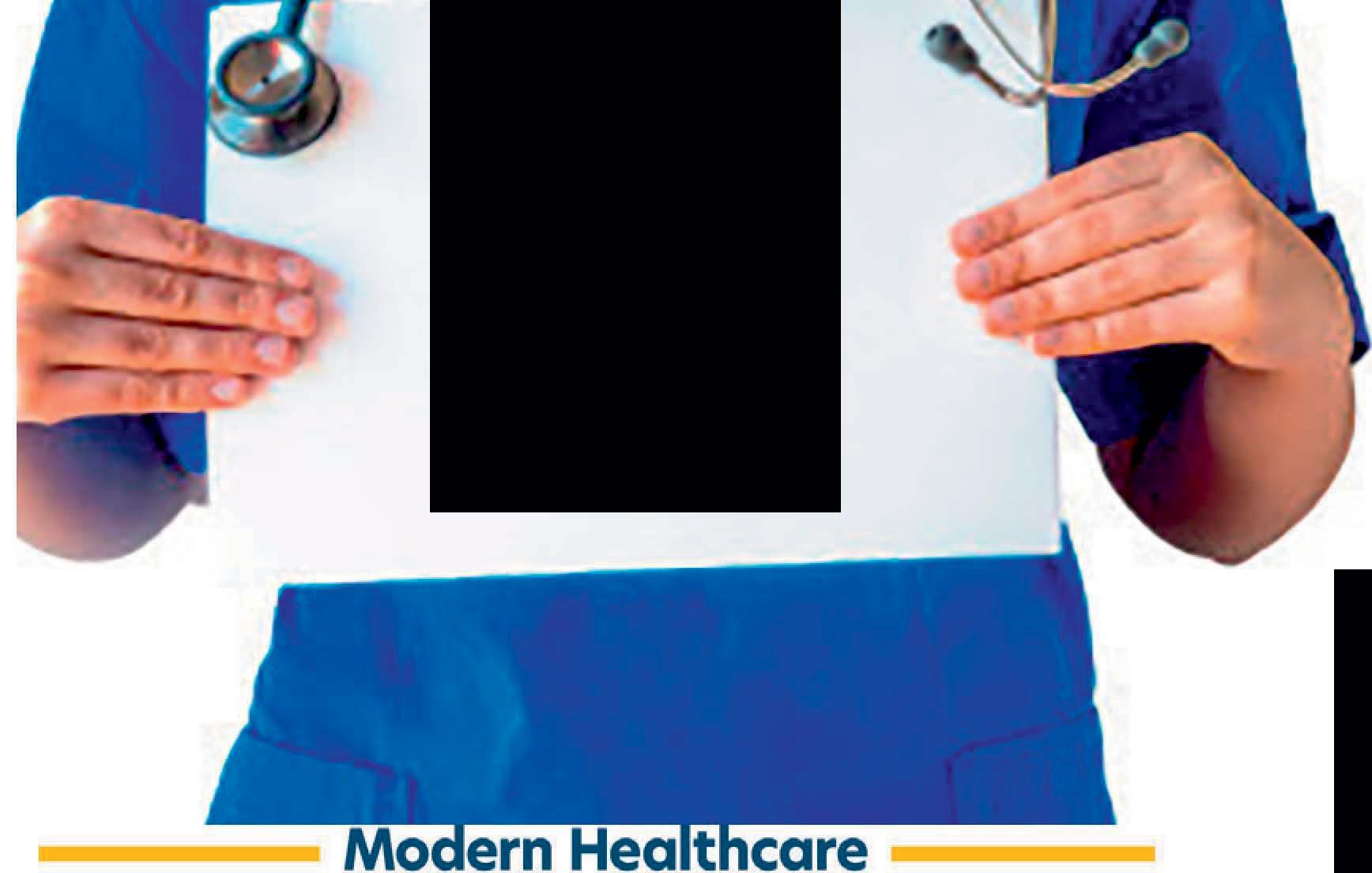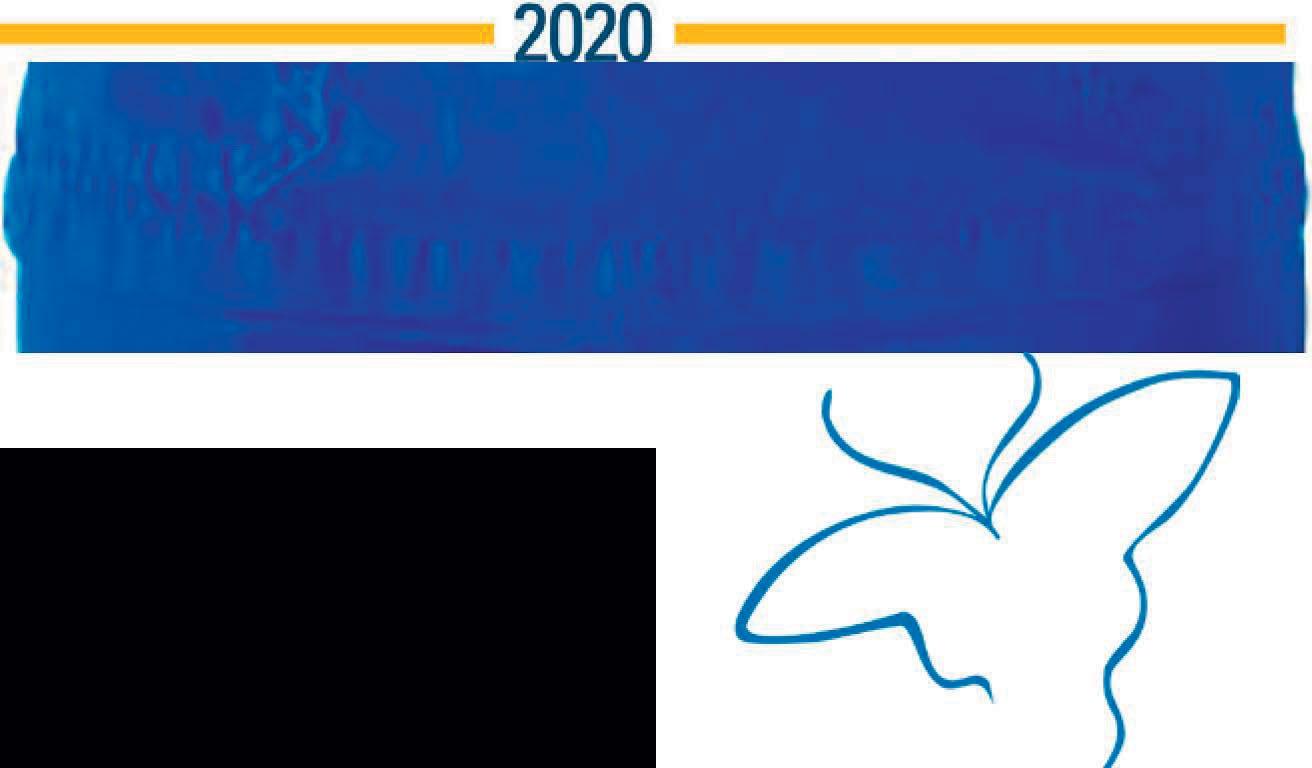















Let me first thank the FNA members that elected me for this prestigious duty. It is my honor. I also want to thank our Executive Director, Willa Fuller, the FNA staff, past President, George Peraza-Smith, and the Board of Directors for their support over the past two years while serving as the PresidentElect. Please know that the FNA team is small but mighty.

pandemic of our lifetime. We have triumphed through the delivery of care to many very sick patients despite obstacles, we have continued to deliver education to nursing students despite closed schools and a lack of clinical space, we have been steadfast in encouraging people to get a vaccine, stay safe and wear a mask, and we have worked with our legislators to bring nursing issues to the forefront along the way. This act alone helped us be successful in attaining reinstatement of the Florida Center for Nursing. The Center will be to be located at the University of South Florida. The Center is the workforce data collection unit for nursing in Florida.
A recent report from the Florida Hospital Association indicates a projected shortage of approximately 59,000 nurses by 2035. We have much to work on including recruitment and retention, improving National Council Licensing Examination (NCLEX) pass rates in Florida, and improving workplace concerns.
In September, FNA celebrated a very successful virtual Membership Assembly for the second year in a row. As past President George Peraza-Smith said so eloquently, “the past two years have not gone as expected.” Oh, how true! The past year has proven to be challenging yet rewarding for nursing. We have survived the worse President’s Message
Nurses are reporting that they are physically and emotionally exhausted. Some continue to report a lack of
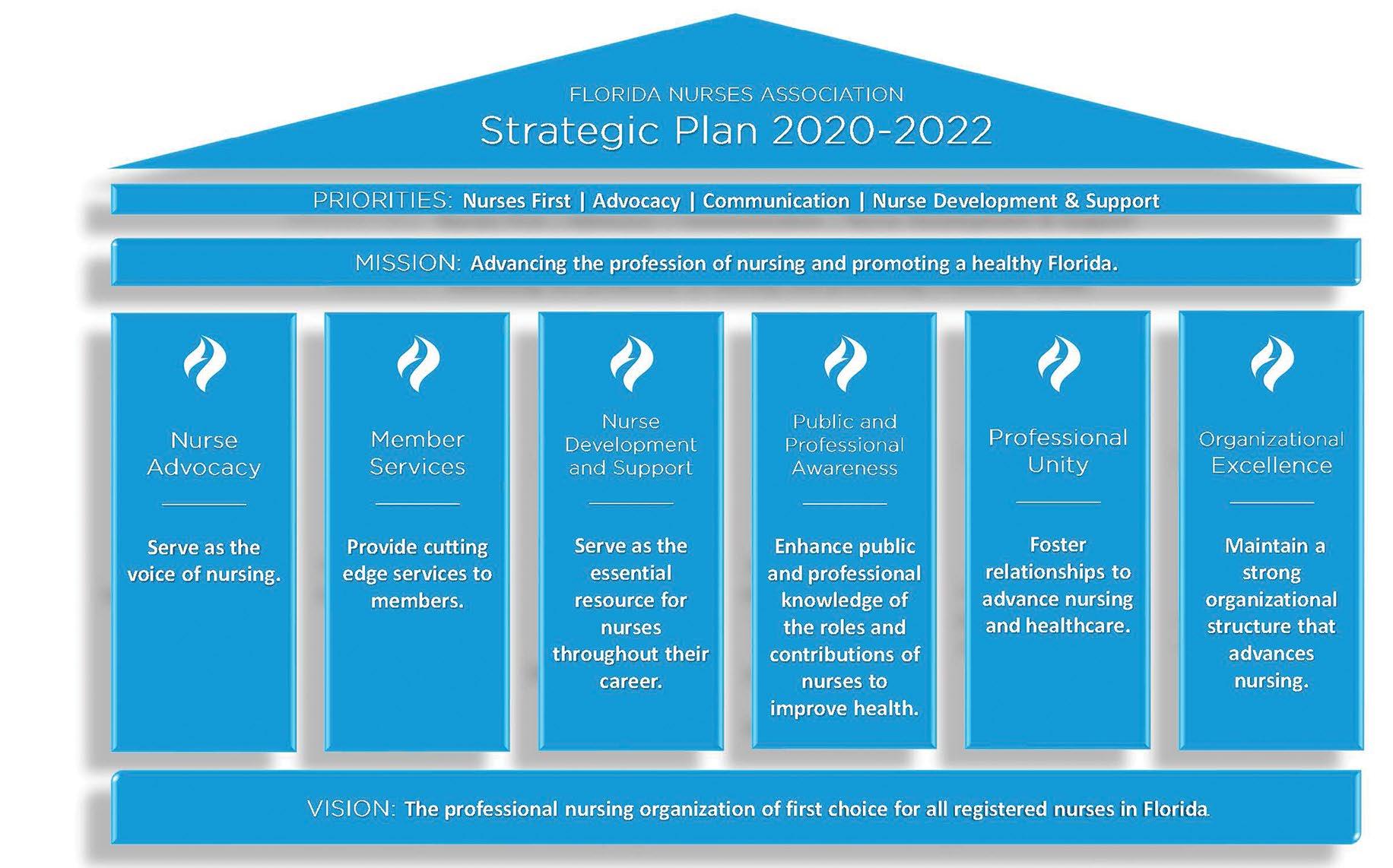
Lately, there has been quite a bit of discussion regarding the nursing shortage and what solutions can be found to address and ameliorate this crisis which was exacerbated by the COVID-19 pandemic and all of the chaos it has caused. One solution that keeps rising to the top is the use of various unlicensed assistive personnel to somehow substitute, supplement or support nursing staff.
 Willa Fuller
Willa Fuller
As I look back on my nursing education and socialization, I think of many of the attributes that separate registered nurses and advanced practice registered nurses from support staff.
The first experience I recall that infused an important message regarding nursing practice was the exercise of being “checked off” on handwashing. There was reading and lecture that preceded that exercise and there were people that actually FAILED HANDWASHING!
Throughout my education, the faculty built on these basic concepts with competency check offs on sterile dressings, urinary catheter insertion and tracheostomy care as well as many other functions.
In addition to clinical functions, we learned about ethics, honesty, confidentiality and other sacred concepts that undergirded the foundations of nursing practice. Historical information about nursing leaders and heroes and information regarding the Nursing Practice Act and legal obligations as well as standards of practice were peppered throughout my nursing education.
My preceptor, who is no longer with us, was exceptional. And she reinforced the knowledge that I had gained in school through her exemplary practice. I specifically remember having to complete an incident report for a med error and she connected it to having a legal record of the incident, not punishment. She also connected the error to patient safety and making sure the physician knew so that there could be an intervention if necessary. It was not that serious of an error but her handling of it made it a teachable moment even though I was horrified. Again, it was a part of my growth.
I learned many lessons over my clinical career, and over time, I made the transition from Novice to Expert without really realizing it. I have told this story before, but after I left direct care to become a clinical educator, I met with new orientees to familiarize them with the unit orientation process. I have to say I felt like an imposter in the beginning but this day, one of the new grads literally came bouncing over to me and told me how excited she was that I was her educator. This was quite strange because I was working in an entirely different city and I could not imagine how this young lady knew me. She then preceded to share that I had been her preceptor for two days when she was a student. She said EXACTLY what I had said about my preceptor. “You knew EVERYTHING, we told other students to go to you because you would know and you would help us and if you didn’t know you would find out. You even knew about OTHER nurses’ patients!” I was floored to say the least.
As I looked back on my experiences I thought about some of the clinical situations that my frontline colleagues and I had encountered. What really made an impact were the number of incidences where we headed off disaster or solved an acute crisis by “trusting our gut,” leveraging our education and knowledge and using our power to either intervene, or advocate for our patient. I once wrote an article about “Moments in Shopping Malls” which was literally one of the ways I knew I had made a difference for my patients. I began to put two and two together to see how all of the knowledge I had acquired in school had merged with the coaching by my preceptor (and other nurses on the unit) to create an experience so gradual and natural that I had kind of missed it. As I worked as an educator, I saw how that knowledge became useful in supporting nursing staff. I felt at ease with my answer, or I knew who to go to get answers.
My most important experience was observing the expertise of my nursing colleagues. I once saw a nurse identify increased intercranial pressure and prevent a herniation long before the “textbook symptoms” by following her gut and assessing the patient and calling the physician to get a ventriculostomy inserted before it was too late. I worked with a nurse to identify that our quadriplegic patient had autonomic dysreflexia within minutes of answering his call light. We also intuited that an elderly patient was being abused by her son and averted her discharge also by observing and following our gut. I would venture to say there are millions of incidences of registered nurses making a difference and even saving lives based on their level of education, training and experience.
A few years ago, as a post-op patient, I was in the room with a tech and a resident, when my blood pressure started to rise. It reached 214/114 and this surgeon who was not knowledgeable in this area kept ordering higher doses of the same medication. My hands and feet were swelling and tightening and the thought, “So this is how I am going to go…” wafted through my mind. At that moment, my very young nurse came into the room, I saw her antenna go up and she ran out momentarily and quickly returned, followed by the rapid response team. They calmly started administering the correct medications and after a time my blood pressure started to go down. My nurse was just standing beside me with her hand on my leg. She was the kind of nurse who naturally used humor in her conversation and she continued to do that throughout this situation. After it was over, I subconsciously made sure I could move my fingers and toes and could say words... (yes, I’m chuckling a little).
It was in that moment, in the room where that happened, that I felt most proud to be a nurse. I was saved by my colleagues, and while I was not the least bit surprised, I am ALWAYS in awe of what nurses do every day. Nurses are extraordinary and essential, and it is a critical error to think that just anyone, even the most excellent nurse tech or CNA (and believe me, we need and respect them), can replace us. We must keep our patients safe by demanding the highest level of care delivered by registered nurses and APRNs.

Owned and Published by, Florida Nurses Association 1235 E. Concord Street, Orlando, FL 32803-5403
P.O. Box 536985, Orlando, FL 32853-6985
Telephone: (407) 896-3261
FAX: (407) 896-9042
E-mail: info@floridanurse.org
Website: http://www.floridanurse.org
Office Hours: 8:30 a.m. to 4:30 p.m., Monday thru Friday
For advertising rates and information, please contact Arthur L. Davis Publishing Agency, Inc., PO Box 216, Cedar Falls, Iowa 50613, (800) 6264081, sales@aldpub.com. FNA and the Arthur L. Davis Publishing Agency, Inc. reserve the right to reject any advertisement. Responsibility for errors in advertising is limited to corrections in the next issue or refund of price of advertisement.
Acceptance of advertising does not imply endorsement or approval by the Florida Nurses Association of products advertised, the advertisers, or the claims made. Rejection of an advertisement does not imply a product offered for advertising is without merit, or that the manufacturer lacks integrity, or that this association disapproves of the product or its use. FNA and the Arthur L. Davis Publishing Agency, Inc. shall not be held liable for any consequences resulting from purchase or use of an advertiser’s product. Articles appearing in this publication express the opinions of the authors; they do not necessarily reflect views of the staff, board, or membership of FNA or those of the national or local associations.
Published quarterly, February, May, August and November by FNA, a constituent member of the American Nurses Association.
Editor – Kaitlin Scarbary, 1235 E. Concord St., Orlando, FL 32803-5403
Subscription available at $20.00 plus tax, per year. Members of FNA receive the newspaper as a benefit of membership.
COPIES of The Florida Nurse are available on 35mm microfilm, 106mm microfilm, article reprints and issue copies through Bell & Howell, 300 North Zeeb Road, Ann Arbor, Michigan 48106
Officers
Janice Adams, DNP, MPA, BSN, President Marie Etienne, DNP, APRN, FNP, PNP, PLNC, President-Elect
Debbie Hogan, RN, BSN, MPH, Vice President Valerie Halstead, PhD, APRN, FNP-BC, Secretary Mavra Kear, PHD, APRN, BC, Treasurer
Region Directors
Jake Bush, MSN, RN, Northwest Region
Kellyann Curnayn, DNP, APRN-BC, North Central Region
Susie Norman, MSN, Northeast Region
Constance Dey , BSN, RN, East Central Region
Meghan Moroney, BSN, RN, West Central Region
Cynthia Tagliaferri, RN, BSN, DNP Student, Southeast Region
Camille Baldwin, EdD, MSN, RN, CNE, CHSE, Southwest Region
important equipment to care for their patients at the bed and chairside. Sadly, many have expressed their desire to leave the profession. Such a movement will certainly result in a patient safety concern for the people of Florida.
Nurses have a direct impact on the health, wellbeing, and safety of patients. It is not just nursing that is exhibiting a high turnover and vacancy rates – it is healthcare providers at all levels. Toward that end, nurses need to meet the challenges of the future.
Our 2020-2022 Strategic Plan states that our priorities are: Nurses First – Advocacy – Communication – Nurse Development and Support. We must be laser focused on keeping nurses in the profession, supporting nurses to deliver safe quality nursing care regardless of their work
setting, and finding long term solutions to the workforce shortages we have on the horizon. We do this by inviting all nurses to the table to work together to make nursing stronger and better. We must be the change agents for our own profession!
What can you do? Join your regional meetings and get involved. FNA has several committees that need your help. All committees and special interest groups (SIGs) work to meet the needs of our membership. Please give of your time and become a member of a committee or a special interest group (SIG). Information about regional activities, committees, and SIGs can be found on the FNA website - https://www.floridanurse.org
The Board of Directors and I look forward to hearing from you and having you join us at the table to improve nursing in Florida. President’s Message continued from page 1
Linda Washington-Brown, PHD, EJD, MSN, APRN-C, FAANP, FAAN, South Region
Director of Recent Graduates
Danielle Weaver, BSN, RN, CEN
LERC Liaison Marsha Martin, RN
FNA Office
Willa Fuller, BSN, RN, Executive Director
John Berry, Jr., Director of Labor Relations & Government Affairs
Kaitlin Scarbary, Associate Director of Programs, Technology, and Membership Marketing
Florence Nightingale (1912) said “…the very elements of nursing are all but unknown.”
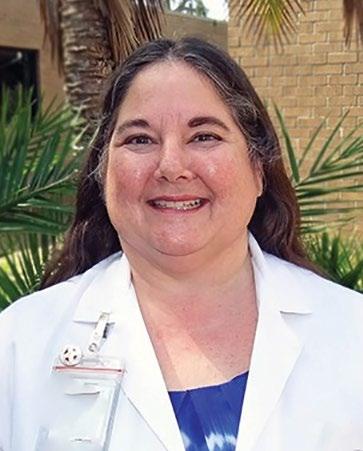
A century later, what nursing is and is not remains poorly articulated. Professional nursing encompasses unique knowledge, skills and abilities gained through specialized college-level education. A registered nurse is constantly perceiving the environment, interpreting observations with an understanding of physical science, and adjusting interventions to meet individualized needs. Hands-on tasks are noticed but the clinical reasoning that guides activities is poorly understood by non-nurses. The essence of professional nursing is invisible.
Individuals are admitted to hospitals and other healthcare facilities because they need highly skilled, hands-on nursing care. Desperate hospital administrators and well-meaning legislators may intend to support over-worked nurses by employing unlicensed personnel, but patient outcome ultimately suffers. Substituting unlicensed support staff for registered nurses is more detrimental than not enough nurses when it comes to missed care, failure to rescue, and patient mortality (Twigg, et al., 2018). Dozens of studies published over the past twenty years show that appropriate skill mix is crucial to saving lives.
The essential work of a registered nurse extends beyond observable clinical tasks. Registered nurses autonomously review diagnostic data and observe subtle patient cues, then organize care and adjust treatment interventions to meet a patient’s unique needs (International Council of Nurses, 2013; Nibbelink & Brewer, 2018). Decision-making is analytical and intuitive and occurs continuously as the nurse performs what appear to be simple care tasks. Situation awareness, critical thinking, and complex decision making distinguishes professional nurse from helpful caregiver.
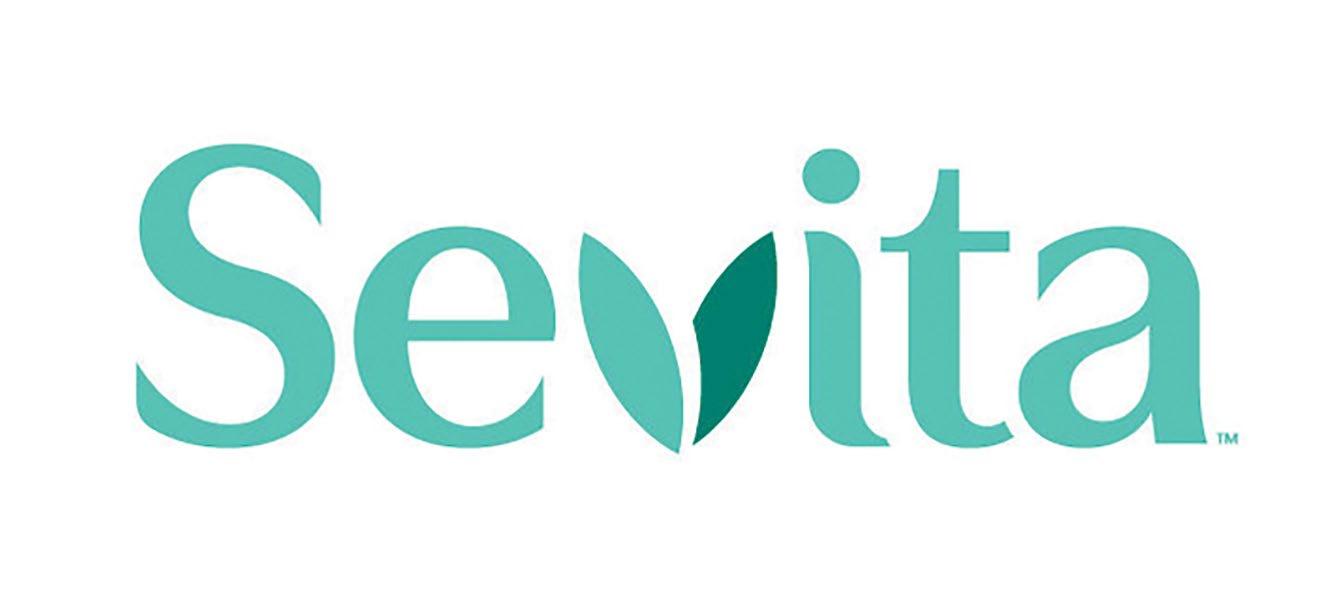

Consider what seems a simple task of assisting with feeding. A lay person can cut food into small bites and move a fork from plate to mouth to provide nourishment. Most will recognize a patient in distress and call the nurse. A certified nursing assistant (CNA) knows to prevent choking by checking that the mouth is empty before shoveling in the next serving. The CNA can recognize troubling changes in mental alertness or breathing pattern before a patient is in acute distress. A registered nurse who feeds a patient automatically judges the appropriateness of the meal texture for safe swallowing and nutritional value for the individual. Simultaneously, the nurse scans the environment and assesses the person’s mental status, functional deficits, skin color and condition, respiration quality, catheter drainage, and more. The therapeutic rapport built during that interaction is invaluable.
Pharmacists and respiratory, physical and occupational therapists all have assistants who are state-licensed support staff. No one believes it is feasible or appropriate to recruit lay persons to take over any of their skills. Likewise, there is no need to add support roles to deliver nursing care. Registered nurses safely delegate tasks to licensed practical nurses and certified nursing assistants. Scope of practice for each role is defined in legal statute. Education qualifications are known and monitored in the best interest of public safety. Invariably, legislative proposals for new unlicensed assistive personnel include inadequate, unregulated training and no statutory responsibility for poor outcomes.
A licensed registered nurse is legally and ethically accountable for upholding current quality care standards to maximize safe patient outcomes (NCSBN, 2019). Failure to meet accepted standards of care in accordance with the Nurse Practice Act is cause for legal action against a registered nurse’s professional license. Using unlicensed staff for patient care activities, even if such assignment is specified in agency policy, does
not mitigate professional accountability. Nursing knowledge and judgement cannot be delegated. Allowing hospital administrators or legislators to give away patient care duties to persons who lack the education to critically interpret subtle cues in health status jeopardizes patient safety and wellbeing. It also may unwittingly jeopardize a busy nurse’s livelihood.
The world-wide COVID-19 pandemic has devastated the healthcare system. Nurses are working harder than ever to care for sicker patients. The overwhelming physical, mental, and emotional toll on each nurse and high level of staff turnover is unprecedented. It is imperative in this time of critical nursing shortage not to erode the profession of nursing by giving away what may seem mundane tasks. Nurses must safeguard patients and professional nursing practice by asserting their irreplaceable value in care delivery. It is essential that nurses educate non-nurses on the invisible essence of nursing care and help craft solutions that promote public health and safety.
References
International Council of Nurses (2013). Scope of Nursing Practice. Position Statement . Available 10/8/2021 https://www.icn.ch/sites/default/files/inline-files/ B07_Scope_Nsg_Practice.pdf
National Council on State Boards of Nursing (NCSBN) and American Nurses Association (ANA) Joint Statement on Delegation. (April 29, 2019). https:// www.ncsbn.org/NGND-PosPaper_06.pdf
Nibbelink, C. & Brewer, B. (2018). Decision-making in nursing practice: An integrative literature review. Journal of clinical nursing, 27 (5-6), 917–928. https://doi.org/10.1111/jocn.14151
Nightingale, F. (1912). Notes on Nursing: What It Is and What It Is Not. New York: D. Appleton and Company.
Twigg, D. E., Kutzer, Y., Jacob, E., & Seaman, K. (2019). A quantitative systematic review of the association between nurse skill mix and nursing-sensitive patient outcomes in the acute care setting. Journal of Advanced Nursing, 75 (12), 3404–3423. https:// doi.org/10.1111/jan.14194


Each year the Foundation has to receive a certain threshold of donations to maintain our 501c3 nonprofit status. As we approach the end of the year, we ask that each of you consider supporting the Foundation and its important work by making a small donation. If each member donated only $10, we would meet our required threshold. For those who are able to give more, we gladly welcome the support. The Foundation’s mission is to promote nursing and delivery of healthcare through the advancement of research, education and practice. Founded and maintained by nurses for nurses, its an excellent way to give back to the profession. Please consider making a small donation online at www.floridanurse.org/giveback
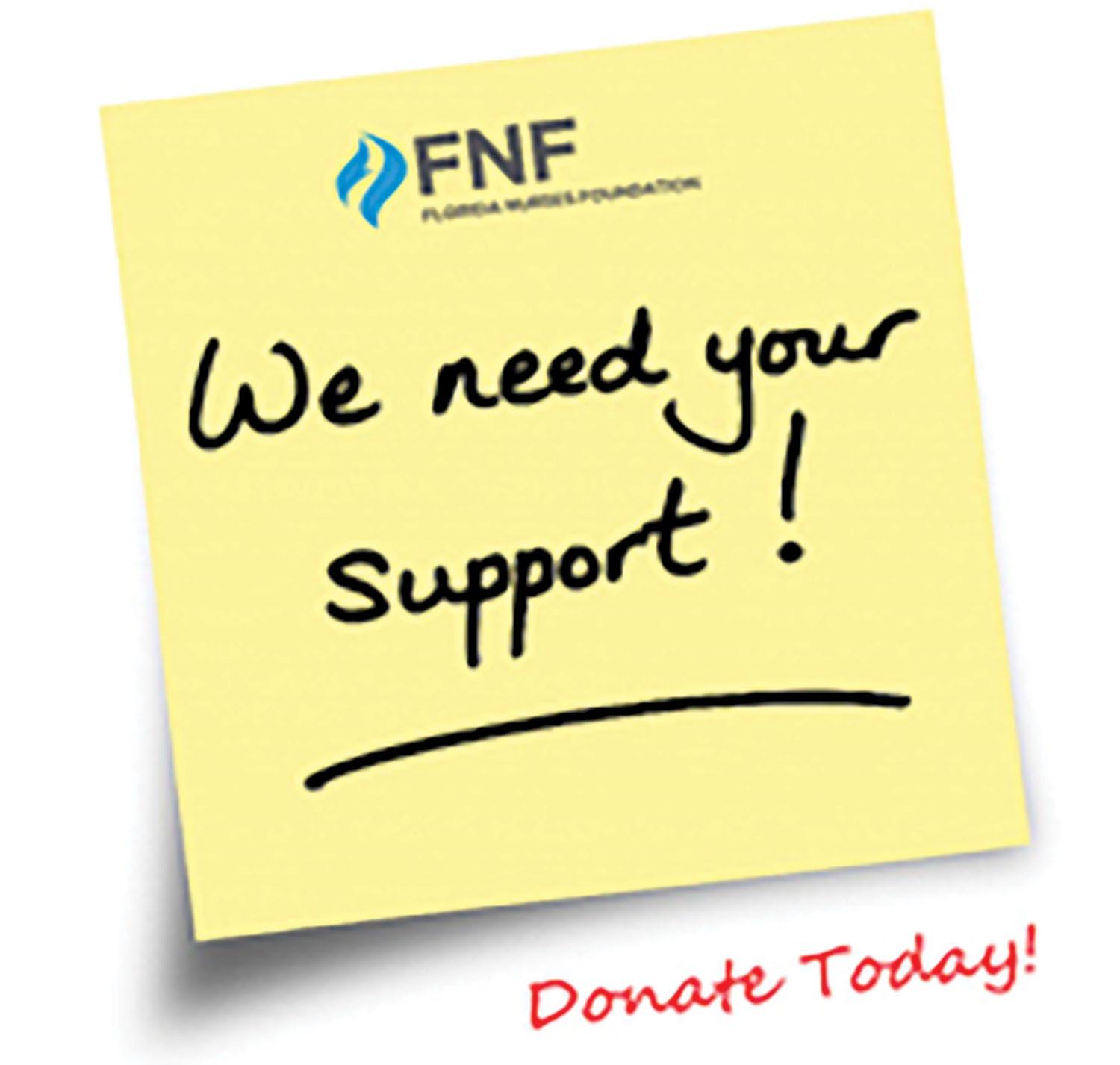
The Foundation also has a new fund that we are seeking donations for. The “Dr. Sandra Walsh Fund,” once fully endowed, will provide educational scholarships and research grants in honor of longtime FNA member, researcher, nurse, and artist, Dr. Sandra Walsh. To contribute to this fund, please go to www.floridanurse.org/SandraWalsh-Fund. You may also use the Foundation donation link and write Dr. Sandra Walsh Fund in the comments section of your order. Donations to any specific fund contribute towards our annual fundraising goals.
Thank you for your support!

View full calendar at www.floridanurse.org/events
Conversations from the Heart hosted by the Holistic Nurses Special Interest Group
November 18, 2021 | 5:00-6:00pm ET | Group Meeting on Zoom
Barbara Lumpkin Institute Legislative Boot Camp
December 8, 2021 | 5:00-7:00pm ET | Virtual Presentation on Zoom
2022 FNA Advocacy Days
January 19-20, 2022 | Tallahassee, FL | Details at www.floridanurse.org/AdvocacyDays
Heart Connection Webinar hosted by Southeast Region
February 9, 2022 | 6:30pm ET | Virtual Presentation on Zoom
12th Annual FNA South Region Symposium & Awards Ceremony
April 9, 2022 | 8:00am – 2:00pm ET | Gulfstream Park, Hallandale Beach, FL
8th Annual FNA Nursing Research and Evidence-Based Practice Conference
J uly TBA | 8:00am – 4:00pm ET | Location and date pending
2022 FNA Membership Assembly
September 22-24, 2022 | Mission Inn Resort, Howey-in-the-Hills, FL
Health Policy Special Interest Group
Every Second Tuesday | 7:00-8:00pm EST | Zoom Meeting / Conference Call
Ethics Special Interest Group
Every Third Tuesday | 6:00-7:00pm EST | Zoom Meeting / Conference Call
Holistic Nursing Special Interest Group
Every Third Thursday | 5:00-6:00pm EST | Zoom Meeting / Conference Call
Interested in presenting for FNA? Go to www.floridanurse.org/speak
Members of FNA/ANA will be given priority.
We welcome all nursing students and Registered Nurses regardless of membership status to all of our events unless otherwise noted. For registration and more information about FNA events, go to www.floridanurse.org/events
The Florida Nurses Foundation will begin its 2022 Scholarship Cycle on January 1! We encourage students who are currently enrolled in a CCNE or ACEN accredited nursing program to take advantage of this opportunity! The Foundation has over 30 available scholarships each year. Some have specific criteria, such as geographic location or specialty, while others have general requirements. Each year we have scholarships that are not awarded due to a lack of qualified candidates. Applicants submit a single generic application and during the review process are matched with potential scholarships based on the information submitted.
Nursing Research Grants are also available through the Foundation with the aim of encouraging the research career development of nurses. The principal investigator must be a registered nurse and be licensed to practice nursing in Florida. Applications for the research grant must be for a study (proposed or underway) that has not been completed prior to application deadline. The Foundation is still accepting applications for the 2021 Research Grant cycle. Deadline to apply is December 1, 2021. The application window will open again in January for the 2022 cycle.
Iona Pettengill Scholarship Fund – Statewide scholarship open to anyone interested in Public Health.
Kay Fullwood Northeast Florida Geriatric Nursing Fund – Scholarship open to anyone in Baker, Bradford, Clay, Duval, Nassau, Putnam, and St. Johns counties with a focus in a Geriatric Nursing.
Eleanor Bindrum (District 5 Charitable Trust) Fund – Scholarship open to students residing in South Florida (Miami-Dade, Monroe and Broward counties) with an interest in Perioperative Nursing.
Evelyn Baxter Memorial Fund – Research grant available to nurse researcher residing in Manatee county.
These are but a few of the funds available through the Florida Nurses Foundation. Many funds are general in their requirements meaning they can be awarded regardless of student’s location or specialty. Many scholarships are available to both undergraduate and graduate nursing students. For a full list of available scholarships and application information go to www.floridanurse.org/ScholarshipsGrants
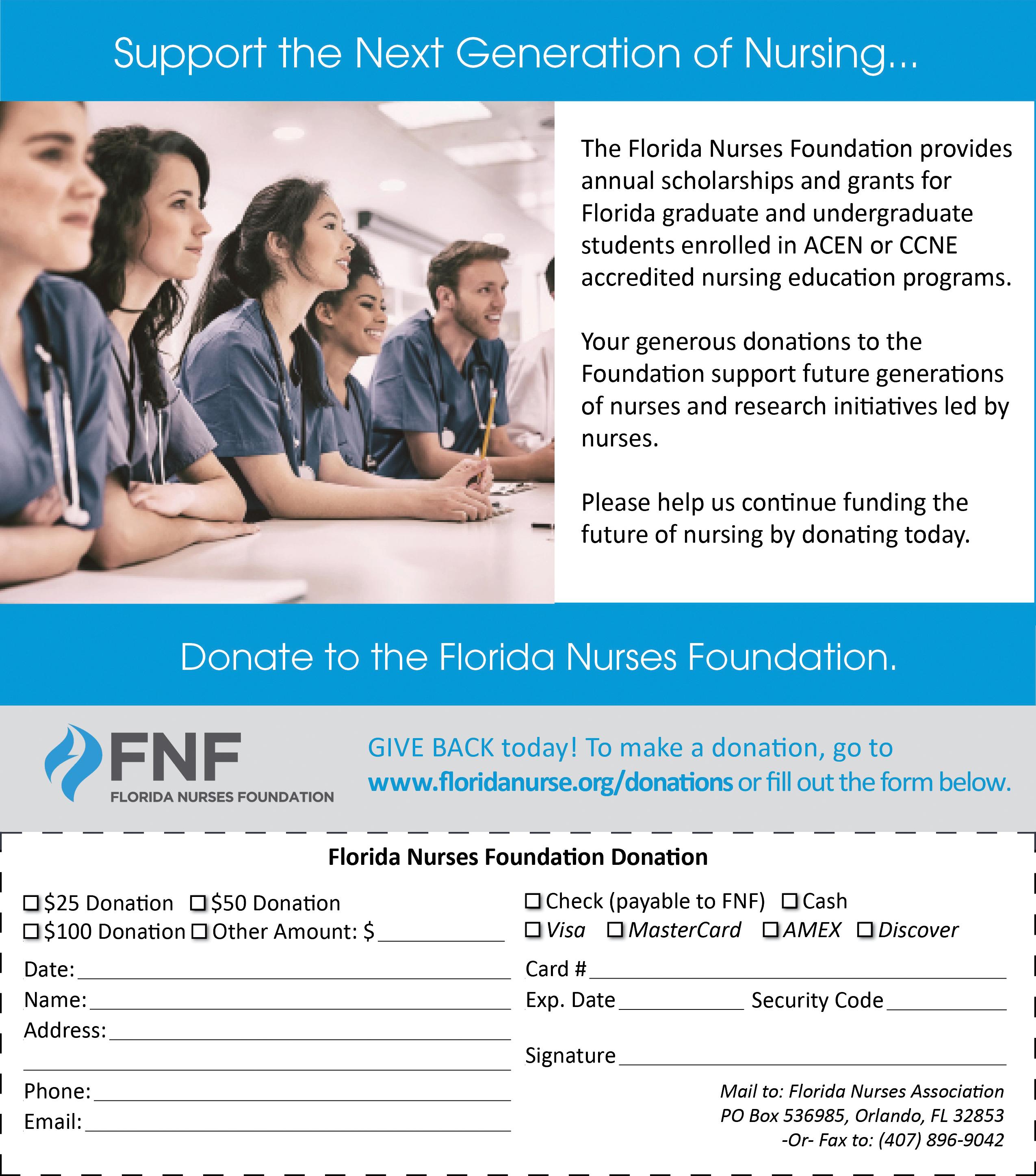


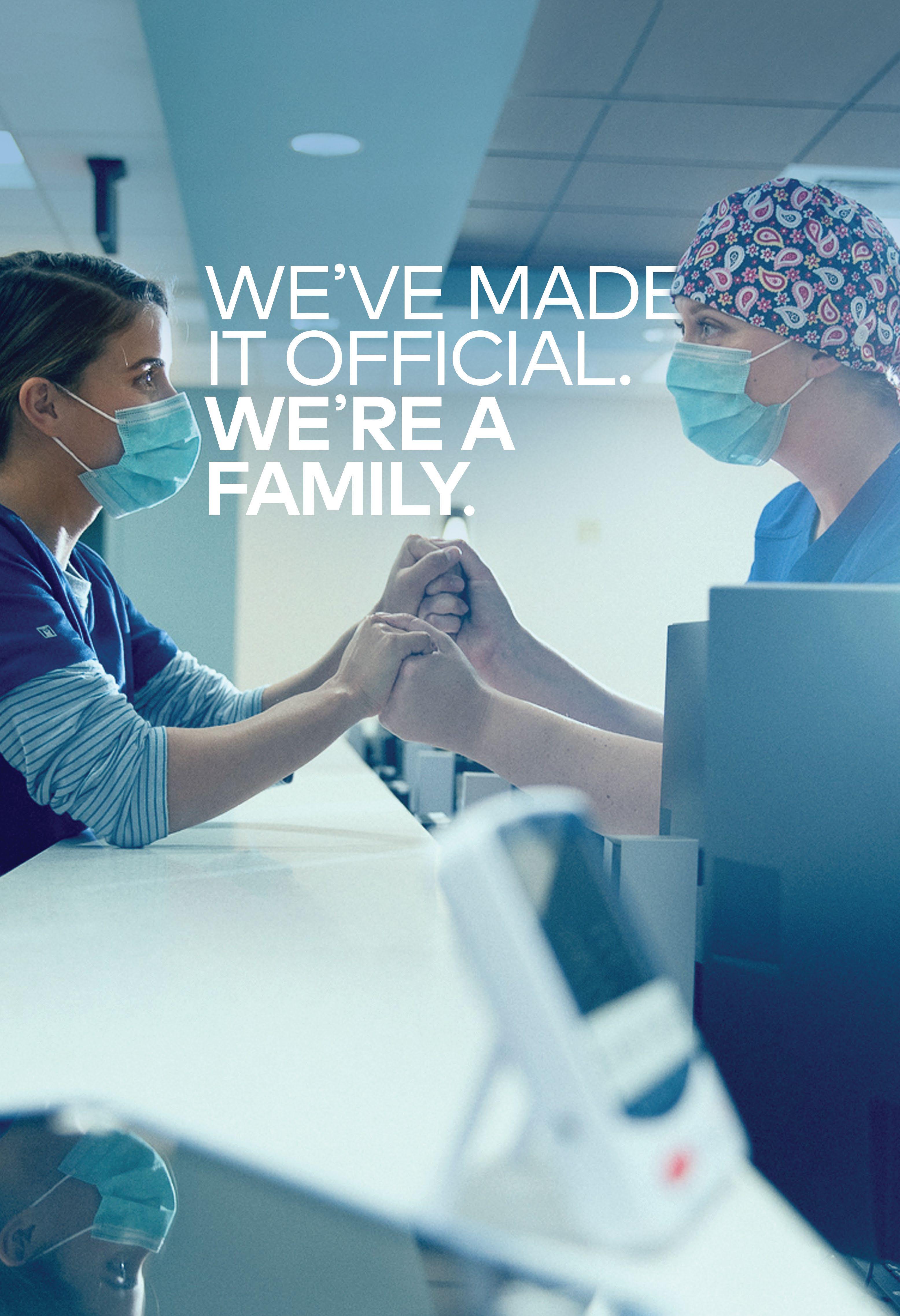
The Florida Nurses Association is excited to announce its newly elected 2021-2023 Board of Directors! These leaders are poised to serve the FNA Membership for the next two years. The prior Board of Directors served with strong leadership and dedication through a very challenging two years. FNA is grateful for their service to the association and the nursing community. The new Board will undoubtedly face challenges as well as many opportunities while guiding the association over the next two years. The new Board Members are:




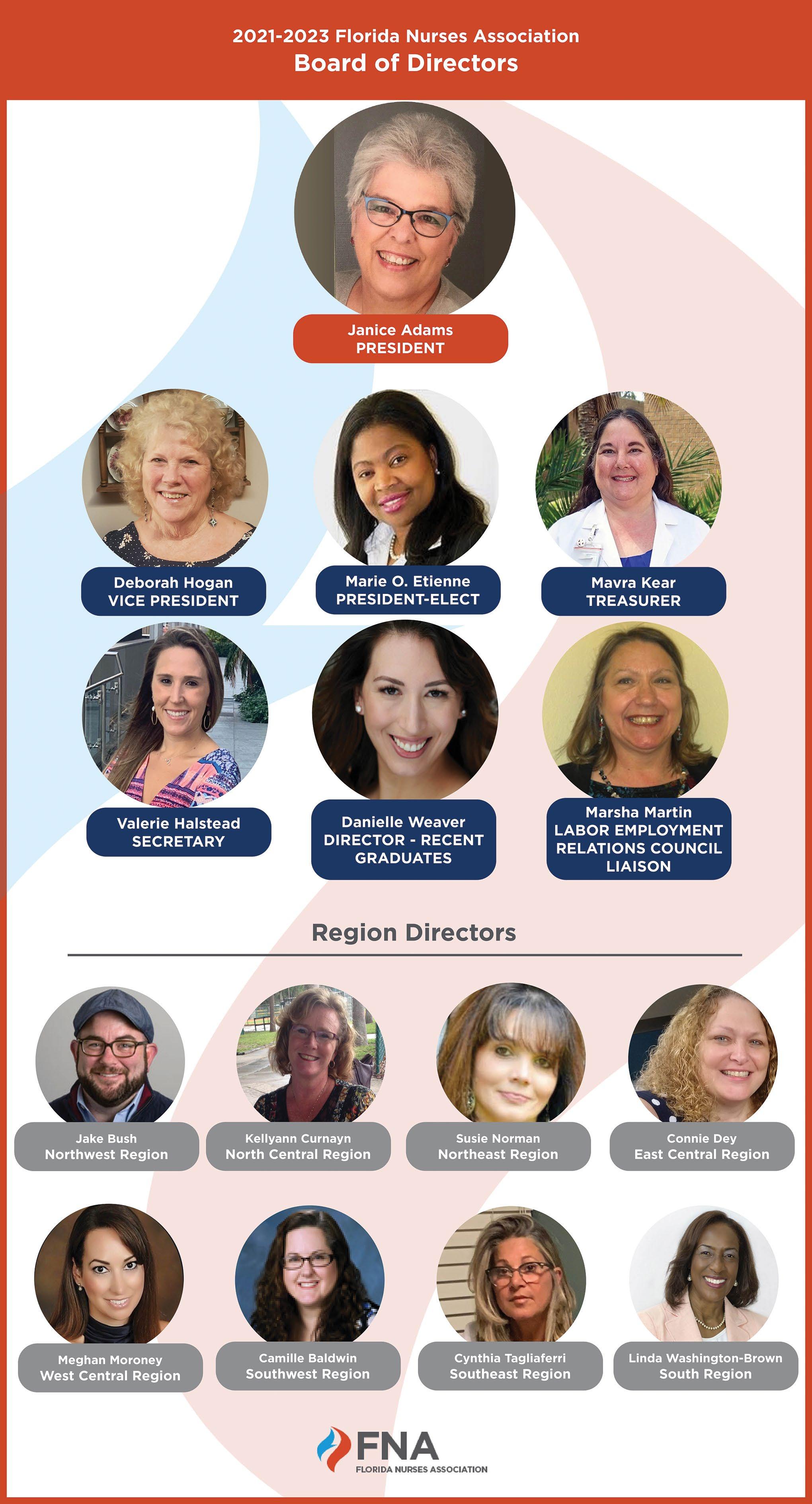
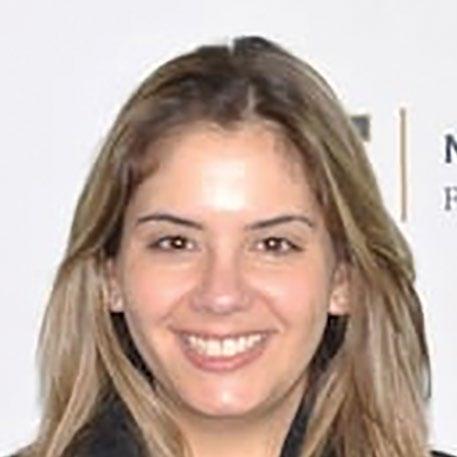




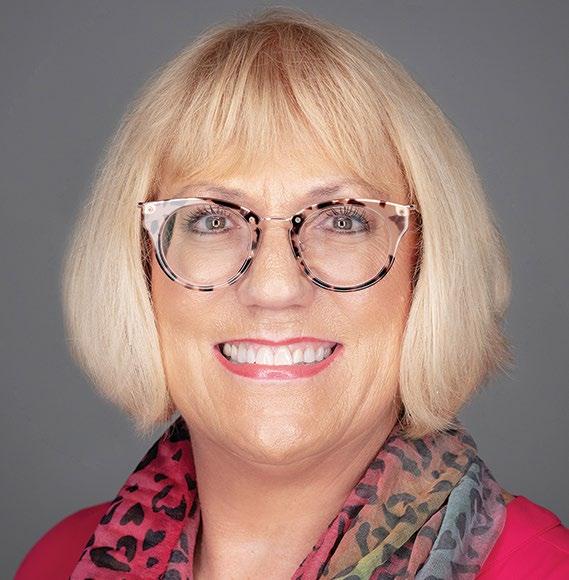
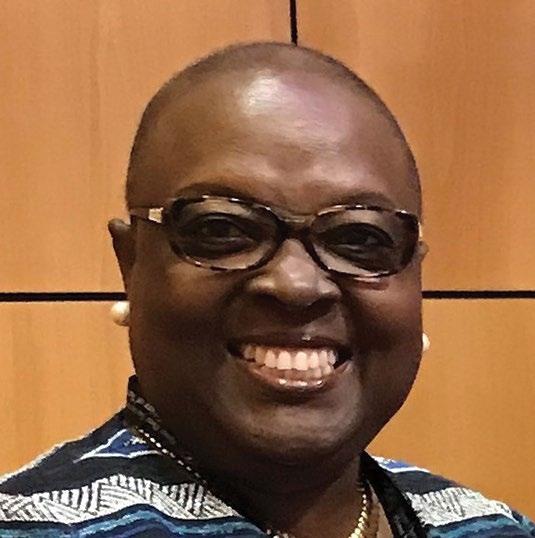



This year, FNA held its second fully virtual Membership Assembly from September 23-25, 2021. The conference boasted several interactive areas for attendees including a virtual awards hall, poster display, and exhibitor hall as well as a social wall for members to converse.

The conference began with a keynote presentation from Sylvia Trent-Adams, PhD, RN, FAAN, Executive Vice President and Chief Strategy Officer at the University of North Texas Health Science Center. The presentation was in the style of a fireside chat and was moderated by FNA Member and chair of the Membership Assembly committee, Versie Johnson-Mallard, PhD, RN, APRN, FAANP, FAAN. The presentation was an inspirational discussion about bringing more nursing voices to the table and ensuring they are a part of the healthcare dialogue. FNA was honored to have Dr. Trent-Adams join us for this special presentation and truly appreciates Dr. Johnson-Mallard for her work in making this session possible!
Additional inspiring plenary sessions included “Wrapping Equity and Inclusion into your Everyday Practice” presented by Deborah Taffe, PhD, MSNeD, RN, Barbara Blythe Lovell-Martin, PhD, MS, RN, and Fay Mason, DNP, RN and “Conscious Heart Connection: A Tool for Self-Care and Wellbeing in the 21st Century” presented by Ilene Gottlieb, RN, CHTP, CHP, CMI, CQP.
Multiple high-quality sessions were enjoyed during our breakouts as evidenced by outstanding session evaluations. One of the advantages of having a virtual conference this year is that participants were able to watch recorded sessions after the assembly, so they didn’t have to worry about missing out on any of the exceptional presentations! Thank you so much to the FNA members who participated as speakers and moderators for our conference. A call for presentations
for the 2022 Membership Assembly will be sent out in January.
The FNA Icon Awards were presented this year to honor outstanding nurses across the state (see page 9 for the recipients). The awards were presented during the opening sessions of the conference and awardees were featured in the virtual awards hall. Several award winners shared video messages which were presented during the announcements and can be viewed on FNA’s YouTube channel. This year the Awards Committee created a new category of awards honoring outstanding team efforts during the pandemic. The two recipients of this award were the Orlando VAHCS LTC Strike Team and the MICU at UF Health Jacksonville.
FNA’s Business Meeting was held on Saturday, September 25. Two reference proposals were adopted by the assembly after vigorous discussion: “Promoting Social Justice in Health Care” and “Supporting a Coordinating Response During the Pandemic.” The assembly also discussed and passed several bylaws amendments. A Summary of Action with the updated bylaws and reference proposals will be emailed to FNA Members.
Finally, at the conclusion of the Assembly, the 20212023 FNA Board of Directors was sworn into office (see page 6 for full election results).
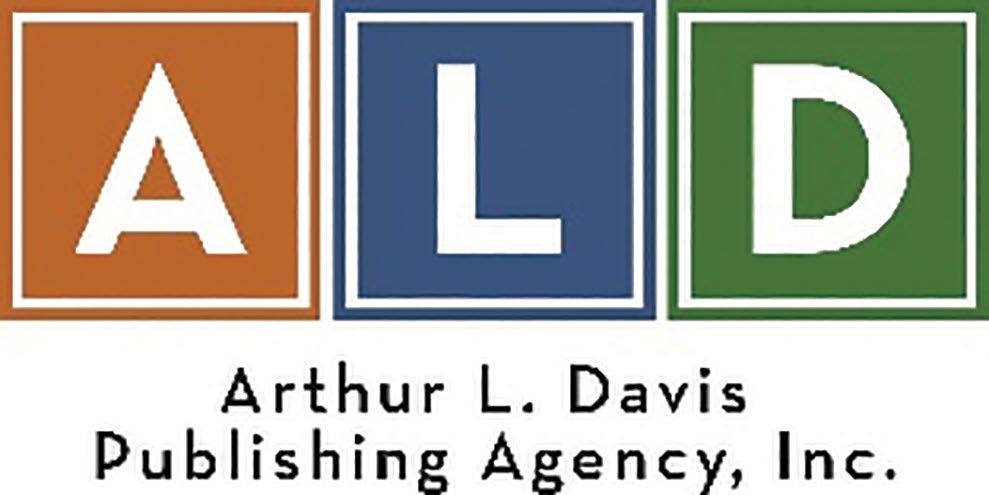
Arthur Davis Publishing
Proud publisher of The Florida Nurse and 38 other professional state nursing publications. Visit our website www.nursingALD. com to view open nursing positions, upcoming events, or search our database of over 1,200+ newsletters.
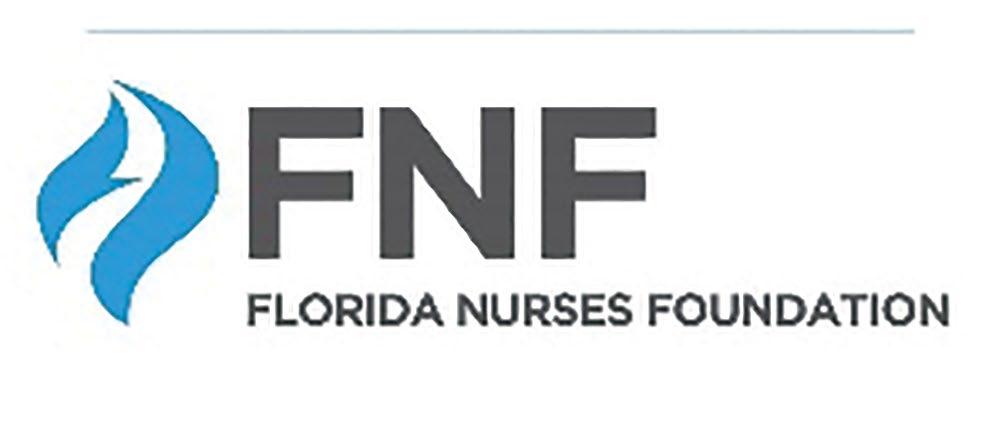
Florida Nurses Foundation
The Florida Nurses Foundation exists to promote nursing and delivery of healthcare through the advancement of research, education and practice. Each year, the Foundation awards scholarships and grants to qualified registered nurses and students. Learn more or make a donation at www. floridanurse.org/Foundation

Nurses Charitable Trust
The Nurses Charitable Trust was founded in 1980 by a resolution prepared by Undine Sams. The trust was established with money from the sale of land donated by Mrs. Frieda Norton in 1947 to the District Five Florida Nurses Association. The Resolution established the trust fund known and specified that income monies would be expanded for religious, charitable, scientific, literary or educational purposes.

We provide talent acquisition services for medical professionals seeking to serve in the US Army and Army Reserve. Our Gainesville, Florida Office is the #1 Healthcare Recruiting Office in the Nation!
Join us at https://www.facebook.com/ GainesvilleArmyMed

University of West Florida
With a history of more than 50 years of being a leader in education, the University of West Florida offers a variety of bachelor’s, master’s, specialist and doctoral degrees with a mission to create the next generation of big thinkers. Based in Pensacola, UWF’s forward-thinking programs prepare students for success through creative, collaborative learning experiences. Consistently named a top Military Friendly® School, UWF holds many accreditations and rankings and provides a wealth of benefits for its online students. Learn more at onlinedegrees.uwf.edu/my/online-nursing-degrees
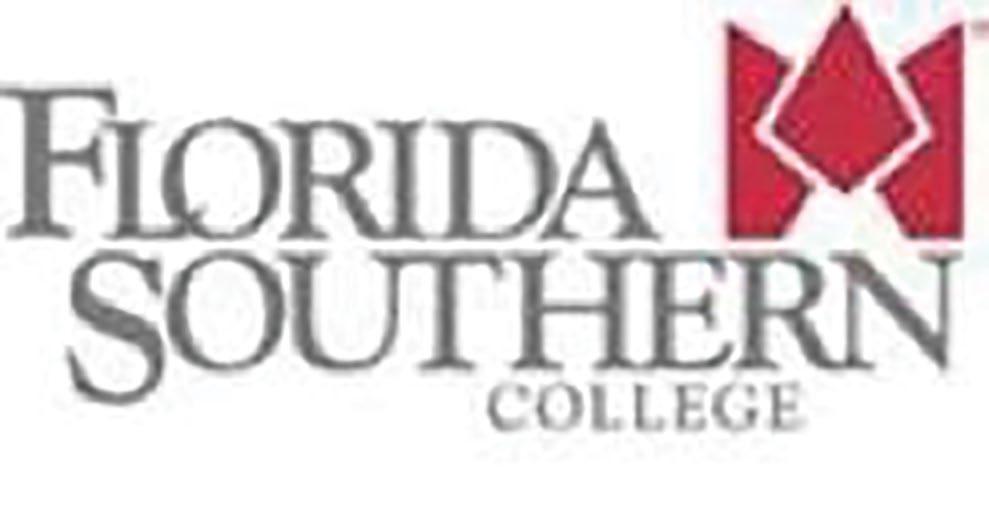
Florida Southern College
Florida Southern offers hands-on training in a convenient hybrid MSN program for nurse practitioners, as well as tracks in Nursing Administrative Leadership and Nurse Educator, which are primarily or fully online. Ready for the next step? Our DNP program is leadership-focused and meets once per semester on campus. Learn more at www.flsouthern.edu/adult-graduate/graduate/ programs/msn
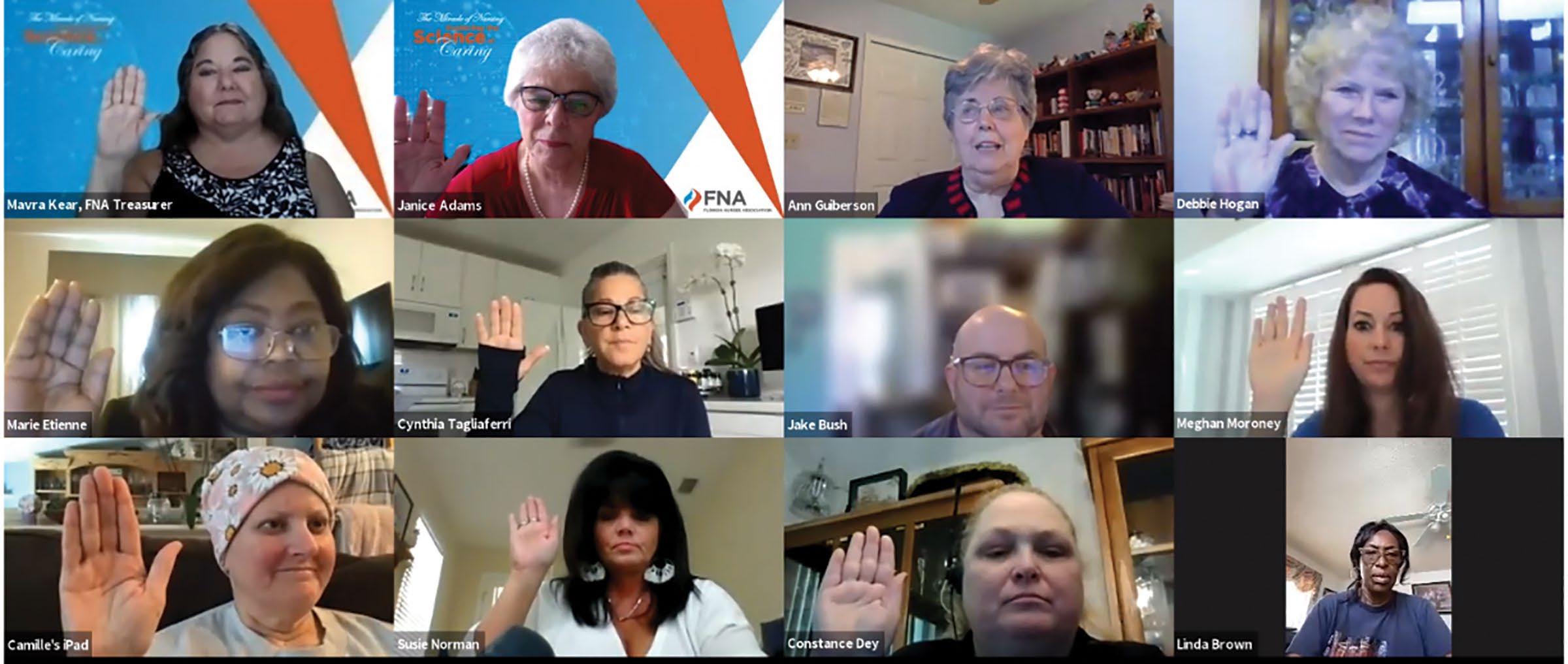
The 2021 FNA Icon Awards were presented at the FNA Membership Assembly on September 23 and 24. 16 awards were presented to nurses who exemplify outstanding leadership in specific areas of impact within the nursing community. The awards ceremony was held virtually over two days during the opening announcements of Membership Assembly. Some awardees submitted thank you videos which were shared with the virtual audience and can be viewed on FNA’s YouTube channel. All awardees were nominated by fellow nurses and submitted for consideration to the Awards Committee. Many outstanding nominations were received this year. Receiving a peer recognition award is a great professional honor and FNA is proud to be able to showcase the accomplishments of these exceptional individuals and groups.

Community Action Icon Award
Linda Washington Brown, PhD, EJD, MSN, PNP, ANP-C, FNP, FAANP, FAAN
“I am humbled and honored to have received the prestigious Florida Nurses Association (FNA) Community ICON Award. My life’s work has revolved around removing
barriers to health care opportunities for diverse and underserved communities. I applaud the efforts by FNA to recognize the work of its members throughout Florida and its willingness to embrace the challenge of fostering community engagement and inclusivity throughout the organization. As a nationally certified advanced practice registered nurse (APRN-C), I am prepared to continue to provide quality health care services to our community and patients, regardless of race, gender, ethnicity, or socioeconomic status. I will continue to embrace the vision of FNA, as well as serve as a role model in the exchange of ideas that will strengthen capacity within the organization, regardless of geographic boundaries.”

Rosa Roche, PhD, APRN, PPCNP-BC
“I am deeply honored and humbled for this recognition in receiving the 2021 Florida Nurses Association Nursing Innovation and Creativity Icon Award. This award represents innovation and creativity demonstrated in nursing education and community service. Thank you for acknowledging my efforts to make a difference in our community.”
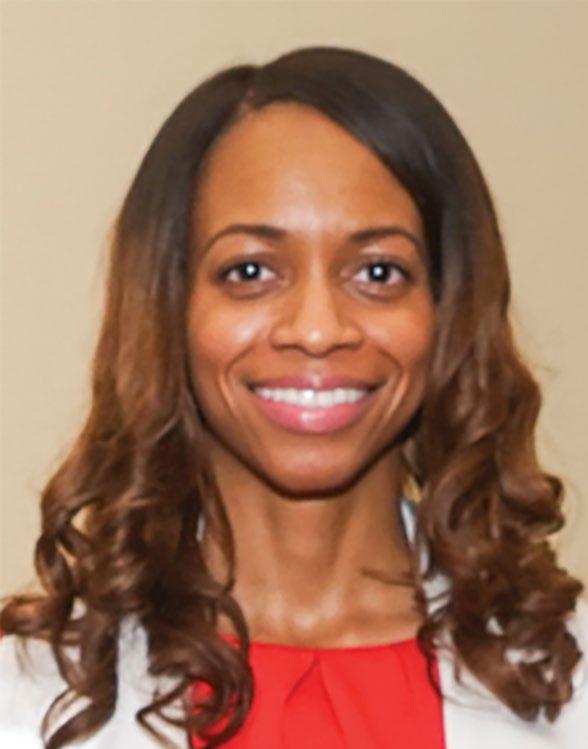

Nursing Innovation and Creativity Icon Award
Patrise Tyson, MSN, APRN, FNP-BC
Ms. Tyson is a nurse researcher and active member in her community. She is the immediate Past President of the Miami Chapter - Black Nurses Association.
Nursing Administration Icon Award
Elizabeth Ana Borroto Levine, PhD, MSN-Ed, RN
“Thank You! I am honored and humbled for having been nominated and selected for this award! I believe to be a Servant Leader, dedicating my energies, and selfless contributions to developing and empowering new nurses, colleagues, and the nursing faculty under my leadership. It is through succession planning and mentoring that we share the mission of advancing the profession of nursing and as we pursue our professional nursing careers, I hope to inspire a thirst for knowledge in others so that they
Icon Award
Recipients continued on page 10

may continue the research and the sharing of scholarly work. In addition, I believe supporting our nursing associations is vital and must be communicated so we continue to draw in nurses and strengthen our voice. Thank you again!”

Mary Cash Award
Charles P. Buscemi, PhD, APRN
“As a Latinx, LGBTQ Nurse of more than 32 years (20 as an APRN) I have made it my mission to always provide culturally competent care and to always keep the needs of the disenfranchised and marginalized at the forefront. Creating a space that is safe, welcoming and inclusive is something I work on daily.”
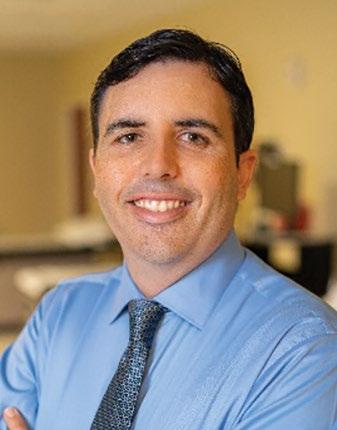
Heather Scaglione Award
Brian Peach, PhD, RN, CCRN
“I am touched to be awarded the Heather Scaglione Award for my advisement of the University of Central Florida (UCF) Student Nurses Association. Heather Scaglione was a UCF student with tremendous potential whose life was cut short too early, and it is an honor to receive an award that memorializes her. Thank you to the Florida Nurses Association (FNA) for this honor. I respect the work this organization does on behalf of nurses in Tallahassee and on the national level, and routinely encourage my students to join the FNA after graduation
so their voices are heard. Likewise, I appreciate the Florida Nursing Students Association for its work in developing our future nurse leaders.
I would be remiss if I did not acknowledge my fellow co-advisor at UCF, Mrs. Kate Dorminy, who plays a pivotal role in mentoring our students. Our chapter’s success would not be possible without support from the UCF College of Nursing administration, faculty, and staff. I wish to acknowledge all the consultants mentoring students across this great state. Thank you for your efforts in developing our future professionals. It is an honor to stand with you. Lastly and most importantly, I extend my gratitude to our tremendous nursing students. Mrs. Dorminy and I are blessed to work with driven, high character adults who are excited to learn and join the profession. What makes my position truly special is mentoring students who are passionate about this profession we all love so much, and serving as their advisor has been one of the greatest joys of my life.”
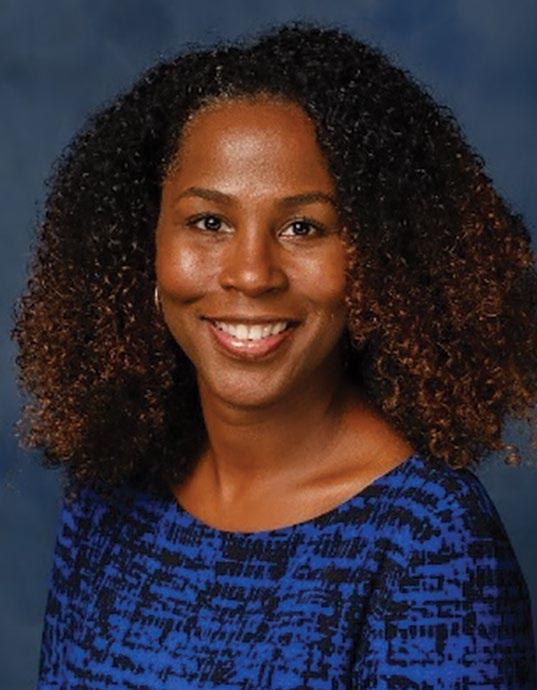
Nurse Educator Icon Award
Shavondra Huggins, DNP, CNS, WHNP-BC, FNP-C, APRN, CNE
“My name is Dr. Shavondra Huggins and I am a clinical assistant professor at the University of Florida College of Nursing and the 2021 Florida Nurses Association Nurse Educator Icon Award Recipient.
For the award ceremony, Huggins shared the following: I am truly thankful for this recognition. I must agree with the FNA by saying “receiving a peer recognition award is one of the highest professional honors.” To be nominated by such a prestigious peer and colleague (Dr. Star Booker) was mindblowing!
For the FNA to select me among many other deserving
nurse educators within Florida as an exemplary leader in a nurse educator role is such an honor.
I am truly grateful for this statewide acknowledgement as it continues to remind me of my life’s purpose.
So again, thank you Dr. Booker for the nomination, thank you to UF College of Nursing for giving me the platform to educate our future nurses, and thank you to the FNA for being recognized as the 2021 Nurse Educator Icon award recipient.”

Patricia Quigley, PhD, MPH, APRN, CRRN, FAAN, FAANP, FARN
“Dr. Quigley has a long and distinguished record of research as well as a record of support and leadership within FNA for many years, including Past FNA President. She is a nurse scientist, nurse consultant, and advanced practice registered nurse. She served as the associate chief, nursing services for research at the James A. Haley VA Medical Center in Tampa, FL. She is the former associate director of the Veterans Integrated Services Network-8 Patient Safety Center of Inquiry. She conducts research which impacts nursing practice and/or health care policy, most recently as Principal Investigator of three national multi-site studies in the area of patient engaged video surveillance within her research agenda of rehabilitation and patient safety. These included studies on patient outcomes, workforce safety, and nursing observation / patient outcomes during the COVID-19 surge. Throughout her career as a Nurse Researcher she has been Principal or Co-Investigator in 38 research studies, awarded over $7.5 mil; co-author of 11 patient safety center grants and funded clinical initiatives, funded for over $13 mil; published over 80 peer-reviewed and 50 non-peer reviewed manuscripts,


book chapters, and products. Dr. Quigley has dedicated her career to embracing and inspiring the spirit of inquiry as she advanced nursing and interdisciplinary knowledge, skills, and capacity for the conduct of research and research translation; lead evidence-based practice and analysis of scientific literature; mentored to nurses’ pursuit scientific inquiry and evidence-based practice, and established of community, state, regional and national partnerships to shape research agenda, policy, and health outcomes. Congratulations to Dr. Patricia A. Quigley.”

Deana Goldin, PhD, DNP, APRN, FNP-BC, PMHNP-BC
Deana Goldin, PhD, DNP, APRN was awarded the FNA award for the Advanced Practice Nursing Icon Award by the Florida Nurses
Association. Dr Goldin is an associate clinical professor and the Family Nurse Practitioner Program leader at Florida International University.
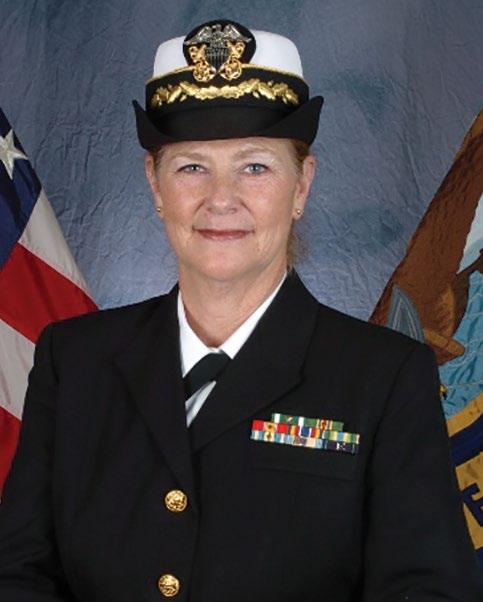
Special Recognition Award
Deirdre Krause, PhD, APRN, FNP-BC
“I would like to extend my gratitude to my colleagues who nominated me for this great honor. I appreciate the many years I have worked with the FloridaNurses Association. The FNA has always been there to help nurses and I had wonderful tenure with them since 1979 when I came to Florida from New York. I believe that more nurses need to become involved with the FNA so the profession can move forward to sustain a strong nursing presence within this state. We,
The Doctor of Philosophy (Ph.D.) in Nursing program at UCF will prepare you for a career at the forefront of nursing science where you’ll contribute to the body of knowledge, test theories, and lead research in the application of innovative strategies for clinical care and nursing education.
QUICK FACTS:
• Courses taught online
• Reduced online tuition and fee waiver
• Nurse Faculty Loan Program (NFLP), fellowships and scholarships
• Two compact intensives annually to enhance learning
TWO ENTRY POINTS:
• BSN to PhD | Full-time
• Post-Master’s PhD | Full- or part-time
Learn more at nursing.ucf.edu
nurses, have a covenant with the people to be there and advocate for them to promote Health and Wellness for all. I have enjoyed my work tremendously and sincerely appreciate this marvelous honor bestowed on me. Thank you.”
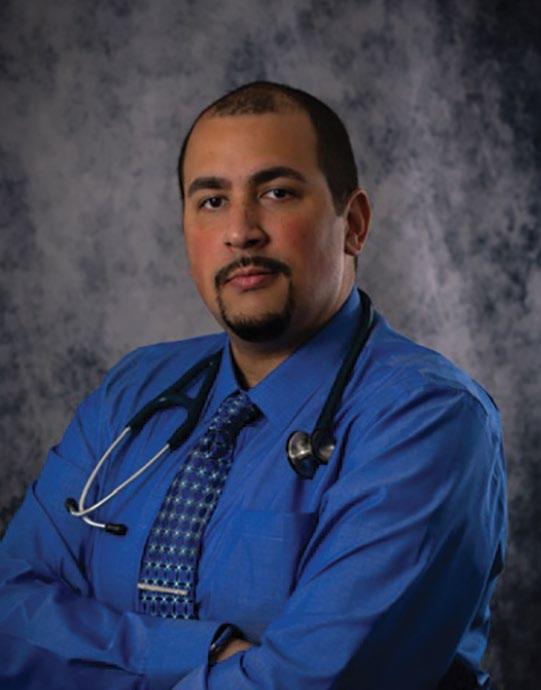
Barbara Lumpkin Award
Vernon Langford, MSN, APRN, FNP-C
“I am truly honored and deeply humbled to be awarded the 2021 Barbara Lumpkin Award recognizing significant contributions in political advocacy for nursing. With continued efforts, it is my strongest desire to advance, along with my fellow dedicated
Icon Award Recipients continued on page 13
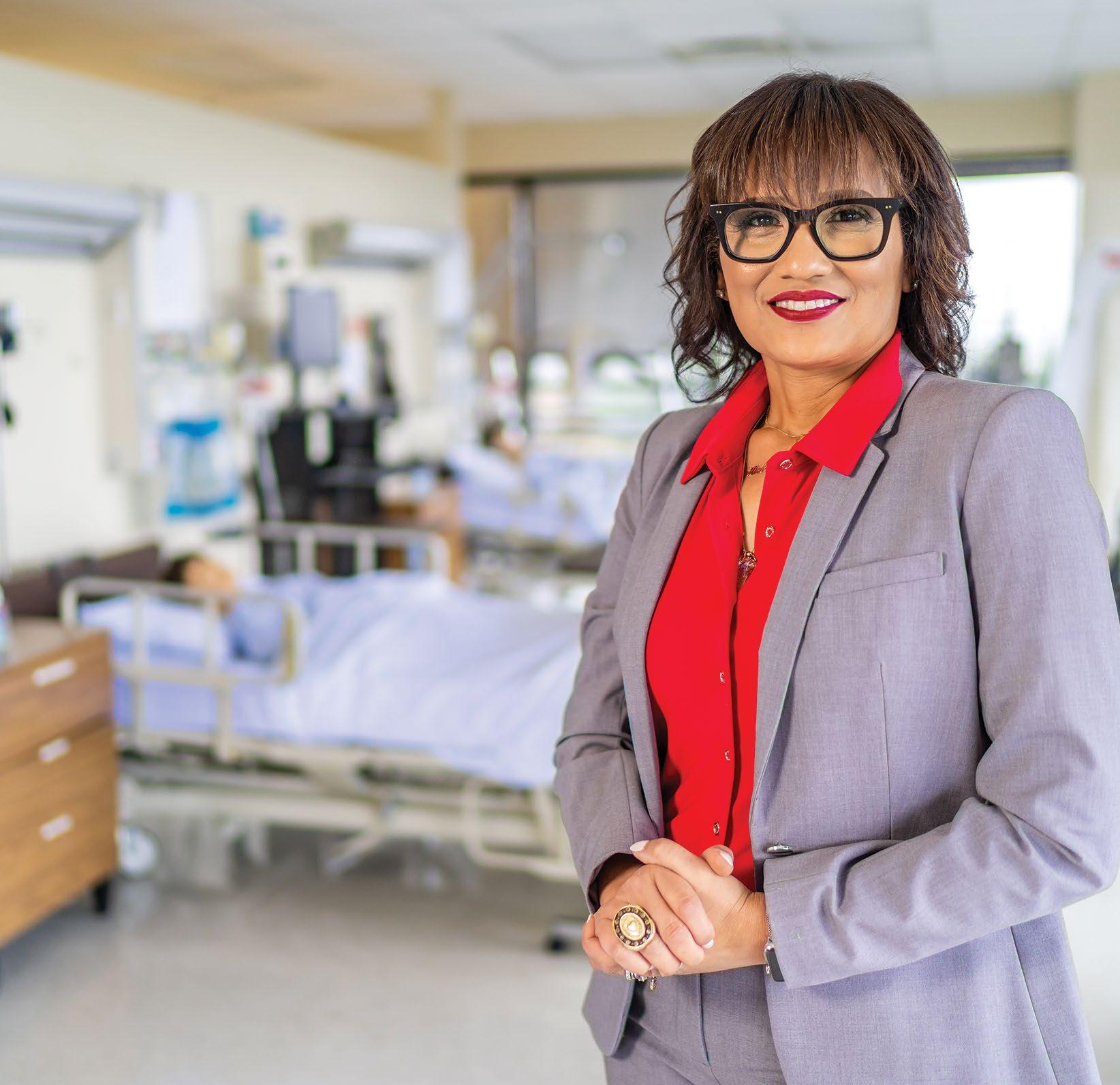


advocates in Florida, our collective issues until there are no unnecessary restrictions or impediments to the practice of nursing. May the progress made in recent years be the foundational springboard upon which more expansive transformational change can occur.”

Promoting Environment for Excellence in Nursing Practice Icon Award
Vanessa Gordon, DNP, APRN, FNP-BC
Dr. Gordon is the Director of Clinical Education for the Graduate Nursing Department at Florida International University.

President’s Award
Barbara Russell, MPH, BS, RN, CIC, FAPIC
Barbara Russell has dedicated her life to the field of infection control practice within the hospital and the community. Over the 59 years of her career, she has been recognized for her work as an infection control practitioner in the local, state and the national arenas. She currently works with the Department of Health ensuring safe practices to protect Florida’s most vulnerable populations.

FNA Hall of Fame Inductee
Janice Hess, DNP, APRN, FNP-BC
Dr. Janice Hess has been an active and involved member of FNA for nearly 30 years and has served in every level of the association from the local district to the Board of Directors. She was a trailblazer in FNA’s legislative programs. One of her greatest contributions to the association was a project in which she traced the history of FNA legislative activity from 1909 to present. This work has opened the eyes of many nurses to the important work of the association and provides the answer to the question “What does FNA do for us?” Dr. Hess is a treasured member who truly belongs in the Hall of Fame.
Gay Allen
Linda Amankwaa
Laura Bailey
Kathleen Blais
Robert Bush
Carolyn Caldwell
Doreen Cassarino
Donna Coad
Kathleen Corbett
Patricia Cordell
Marie Cowart
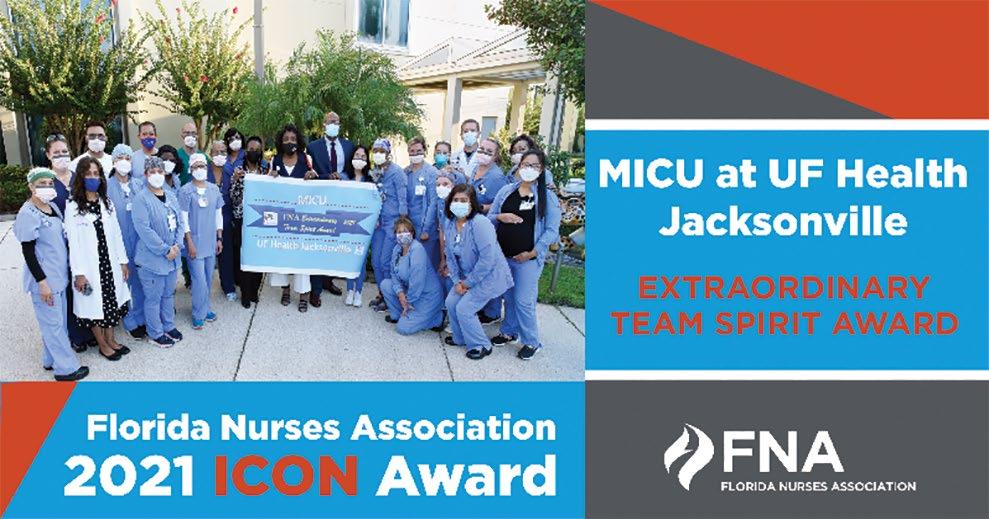

Juan Gonzalez-Concepcion, Sonya Garner (RN), Mariela Rivera
Rivera-Acosta (Infection Control RN), Shakira Francis
Golden, Yvette Turner (Infection Control RN), Maria Jones
Alba
Blanca
Velazquez
Margo Cox
Phylis Craig
Kathleen Decker
Ann-Lynn Denker
Patricia Dewsbury
Marci Dial
Barbara Drummond-Huth
Priscilla Faucher
Barbara Fletcher
Loretta Ford
Willa Fuller
Sima Gebel
Lisa Girouard
Lois Gonzalez
Clare Good
JoAnn Gottlieb
Yvonne Grant
Andrea Gregg
Cherilynn Greij
David Guthrie
Eula Hamilton
Claudia Hauri
Wanda Hazelwood
Sally Hutchinson
Mattie Jones
Lucille Markowitz
Susan McLean
Theota Merritt
Holly Meyerowich
Kifi Mikell
Carla Mills
Rose Oudejans
Sharon Parrish
Bonnie Peacock
Thelma M. Hall
Jean Penny
Jessica Portu
Marilyn Ray
Barbara Redding
John Ryan
Gretchen Schitter
Sandra Snowe
Mary Stefan
Jimmie Stickeler
Selma Verse
Beverly Yeshion Roetter



Hello from your new Director of Graduate Nurses!
My name is Danielle, and I wanted to take this opportunity to introduce myself and the amazing group that FNA has created to welcome new nurses to our profession.
If you are unfamiliar with us, the FNA Graduate Nurses are a group for new-to-practice nurses within five years of RN licensure. The FNA leadership is working not just to engage young nurses in the organization to grow membership, but to cultivate future nurse leaders. As our current nurse leaders begin to retire, it is critical that we have a pipeline of excited, experienced, and passionate young members who are able to step up and lead the organization to continued success.

Whether our members come straight out of high school or after a career change, the transition into nursing is an eye-opening one, especially now.
Indulge me for a minute, if you will. Think back to when you first graduated from nursing school. Combined with the overwhelming sense of relief at being done with boards, did you also feel scared or nervous? Was there a steep learning curve when you started your first job? Did you ever wonder what you actually learned in school (or was that just me)? Now on top of all of that inner turmoil, we have an unprecedented pandemic that has wreaked havoc on our nursing staff, resources, and mental health. Our group is a special one because it’s true that no one else can really understand what it’s like to be a nurse than other nurses.
As the new Director of Graduate Nurses, I bring with me experience leading the Young Nurse Professional group of the Pennsylvania State Nurses Association. When the YNP group started, we had 10 members. Now, they boast over 600 members and counting! We began publishing monthly YNP e-newsletters that featured news, events, and issues that were of specific interest to our YNP members. For example, we talked about the importance of getting involved in the legislative process when we took to the Capitol Rotunda in Harrisburg to speak out against unsafe staffing levels. We highlighted YNPs throughout the state to show what they were working on as new RNs, and we spotlighted events throughout the state where members could network with peers and more experienced nurses. All of these projects and experiences I look forward to bringing to the nurses of Florida – and so much more!
We are in the process of planning exciting events for next year, both social and professional. We hope to provide networking opportunities for our Graduate Nurses to meet nurse leaders throughout the state and also involve more student nurses, as we believe that identifying potential members and leaders early is key to their continued involvement in FNA after graduation.
Although I am no longer considered a “new nurse,” I cannot begin to describe how excited and honored I am to have joined nursing. I am even more grateful that I found professional organizations like FNA to help guide me as I continue to define what it means to be a “nurse.” I look forward to getting to work!
Sincerely,
Danielle Weaver, BSN, RN, CEN Director of Graduate Nurses Florida Nurses Association



careers.kindredathome.com

East Central Region members, my name is Constance Dey and I am so happy to introduce myself as your new Regional Director. Let me start by giving you a little background about myself. I have been a nurse since 2007 and I currently work for AdventHealth as a Clinical Analyst building electronic medical records. I enjoy working with my fellow nurses and helping to develop the needs they require to take care of our patients. I live in Orange County with my husband and my son but on some weekends, you will find me in Tampa visiting my daughter and my two grandchildren. Love being a Nana!
As I start getting acclimated to this new role, I look forward to getting to know you and working with you through meetings, various projects, and community activities. I value your input and suggestions so please send me an email anytime at dolphindey@yahoo.com. My goal for this term is to make East Central Region one of the best regions in the State of Florida so let’s work together and accomplish that goal.
Thank you,
Constance Dey RN, BSN
Hello to all Florida Nurses! My name is Dr. Kellyann Curnayn, DNP, APRN, your new Director of North Central Region. I have long been an advocate for the frontline of nursing and have, apart from work and school, spent personal time and money researching health policy, determinants of health, and health care reform as it relates to “Cost Effective Quality Care.” Nursing is the impetus of creating quality health care
and needs a larger voice on how that is achieved. My professional career as a nurse began at the bedside of VA patients, oncology patients, expectant mothers, ICU patients and their families (CCU, CVICU, MICU), house supervisor, and now I serve as an Advanced Nurse Practitioner in my own practice which opened in June of this year.
My Doctorate of Nursing Practice research focused primarily on how quality of care is defined, created and evaluated. This research was presented at the 26th International Congress for Sigma Theta Tau; evaluating the cost and perceived outcomes of accreditation of FQHCs by The Joint Commission, utilizing an exploratory descriptive interview-style evaluating how macrosystem changes (accreditation) translate to microsystem outcomes (delivery of healthcare). We are the delivery system of health care and are the experts on how to deliver “Cost Effective Quality Care.” My goal is to increase engagement of Florida’s Nurses, discussing actionable plans while simultaneously creating momentum toward solving the problems that currently hinder the delivery of health care.

On August 26, members of the
Region
also had the opportunity to share with Senator Bean some of the issues nursing has been challenged with during the pandemic and continue to face. Senator Bean is President Pro Tempore and the current Chair of the Appropriations Subcommittee on Health and Human Services and is honored to represent our profession in the Florida Senate.

Some of our regional members also had the opportunity to attend one of our local Legislative Delegation meetings and met with Senator Jennifer Bradley and Representative Chuck Brannan on Sept 7. Representative Brannan is the new Subcommittee Chair for Criminal Justice and Property Rights. The group shared our legislative platform with Regional News continued on page 16
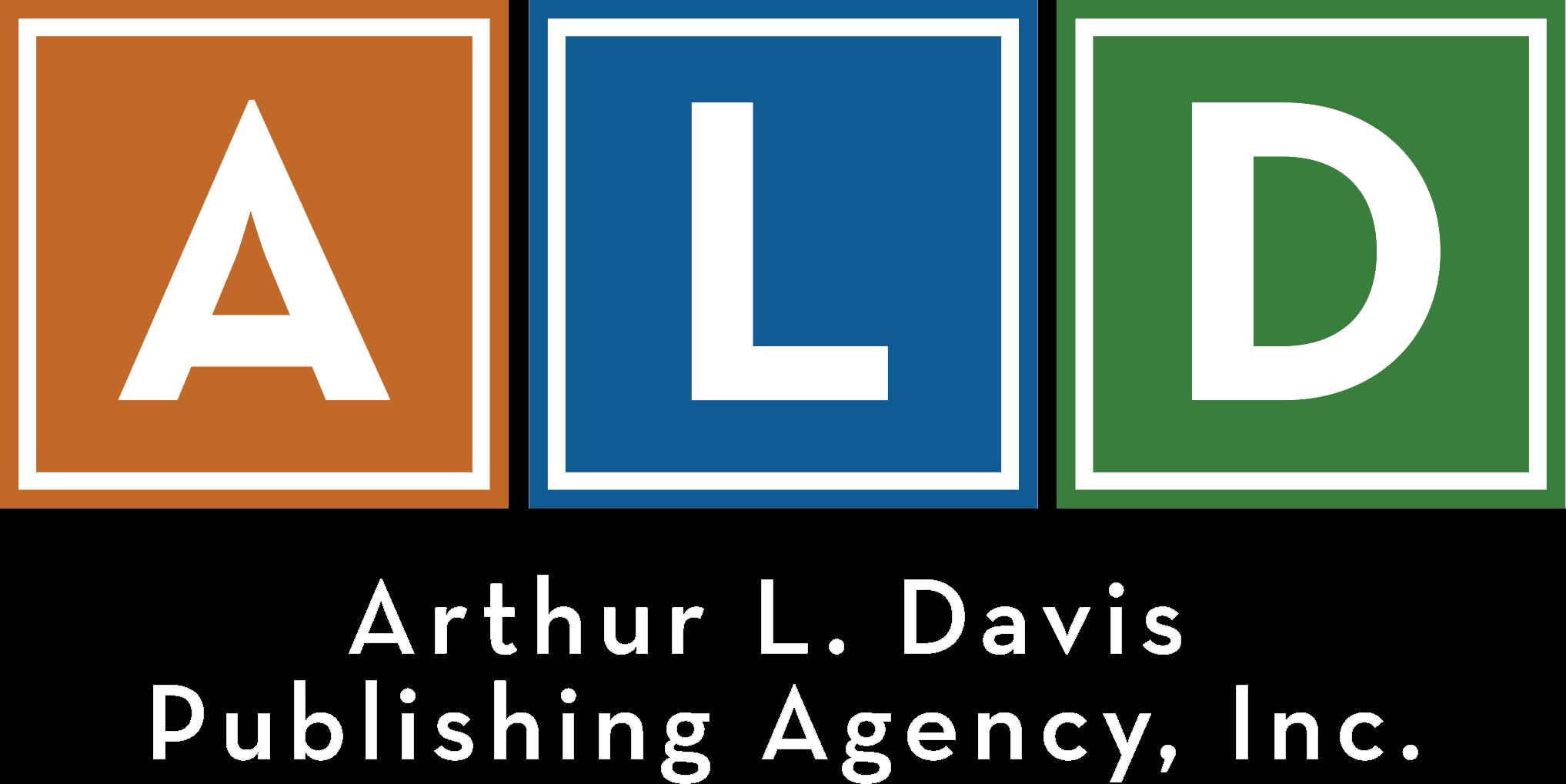






Representative Brannan, specifically about workplace violence and the need for more legislation to protect healthcare workers.
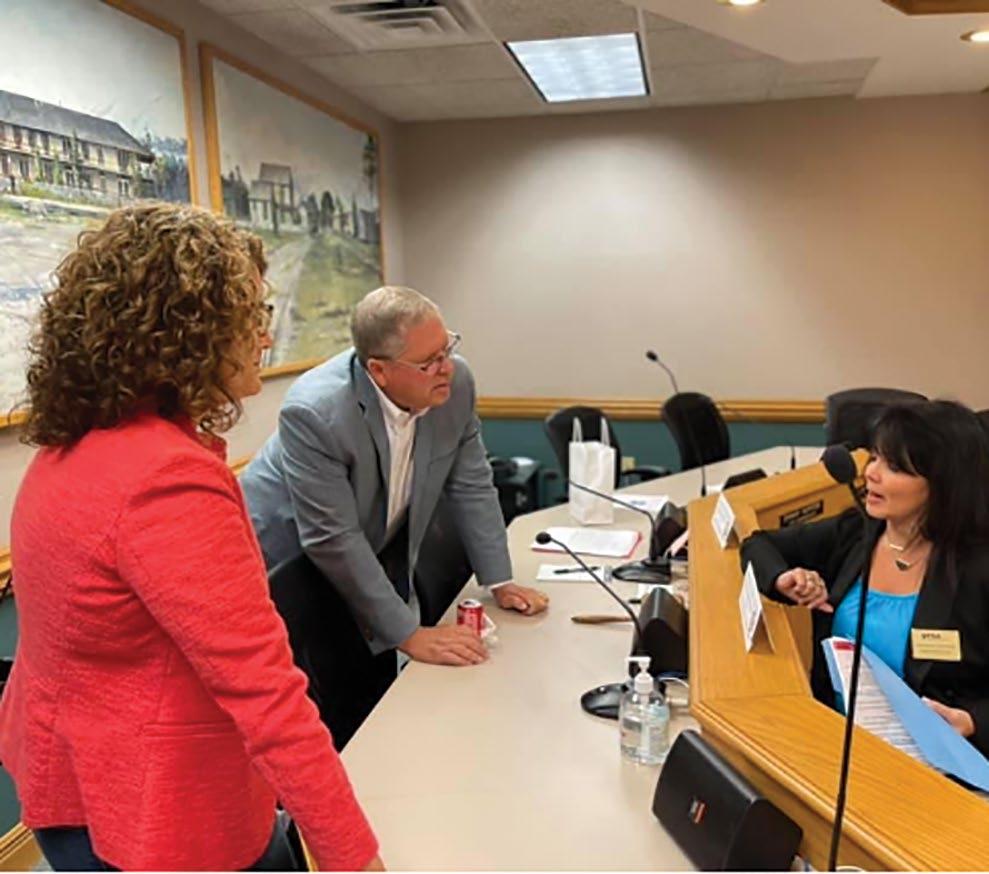
Advocacy days are just around the corner in January. If you are interested in making a positive impact for FNA and your profession, please join our Legislative Action Team. Go to https://www.floridanurse.org/page/ ActionTeamApp to apply. Please check the FNA web page for frequent updates on Grassroot advocacy and volunteer opportunities within our Region.
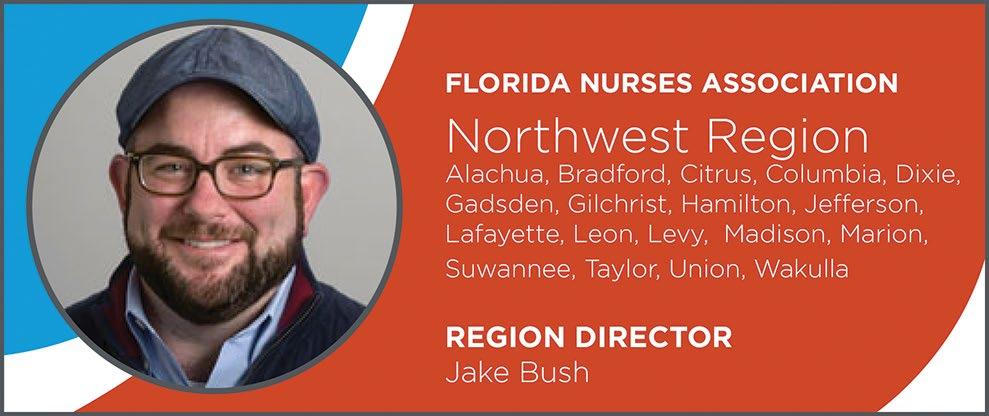
Hello everyone, my name is Jake Bush. I am excited to be the new Northwest Region Director! I have had the pleasure of working with my colleague, Dr. Jill Van Der Like over the last few years. I want to thank Dr. Jill Van Der Like for her leadership of this Region and the guidance she has provided. She is most certainly a mentor and inspiration to me! My professional research interests are broadly mental health and
LGBTQIA+ health. Nursing is not for the faint of heart and now, more than ever, we have to arm ourselves with methods of sustainability. It is my goal to plan various advocacy and learning opportunities over the next two years. If you have any ideas or questions, please feel free to contact me @ stebn21@gmail.com I look forward to hearing from you. I am honored to be of service to you and our Region!
Dr. Jake Bush

Because your vote counted, I am honored to serve as your South Region Director. I have actively served the south Florida community for over 40-years in academia and clinical practice, as a researcher, grant recipient, and journal author. I look forward to working with this esteemed group of professional nurses who share a common goal to promote the safety and healthcare needs of our patients in the south Florida communities, Florida, the nation, and beyond. Through the collective efforts of Florida nurses and the Florida Nurses Association (FNA), I will continue to support the vision to create a unified nursing advocacy program for nurses in the South Region and hold fast to the commitment of providing health equity by empowering our nursing workforce to help end health disparities and improve health care access.
I invite south Florida nurses to join me in our monthly meetings held on the fourth Tuesday of each month at 6 p.m. Please visit the FNA website for updates on conferences and FNA’s Advocacy Day in Tallahassee, scheduled for January 18-20, 2022. I look forward to working with each of you.
Dr. Linda Washington-Brown

It’s harvest time! A time for gathering and giving thanks. Happy November SE Region members!
I am happy to share my enthusiasm about growing our SE region! Our first kick-off leadership meeting, held in early October, was fun, collaborative, and productive! We developed a member survey that rolled out October 10th, to identify our members’ areas of interest and concerns, that will help further increase member participation in a variety of relevant categories.
Our next SE Region leadership zoom meeting will be Wednesday, November 17th, where we will complete a summary review of the survey and create specific committees focused on your areas of interest, and we invite you to join us. In fact, we insist on it! Afterall… strength in numbers!!

Let us not become weary for doing good; for at the proper time, we will reap a harvest if we do not give up:
Galatians 6:9

On Saturday, November 13, I will be attending orientation for the newly elected board members in Orlando, and as your dedicated SE Region Director, I will learn all I can about how to best serve you in this position, and bring back fresh ideas about how to rally,

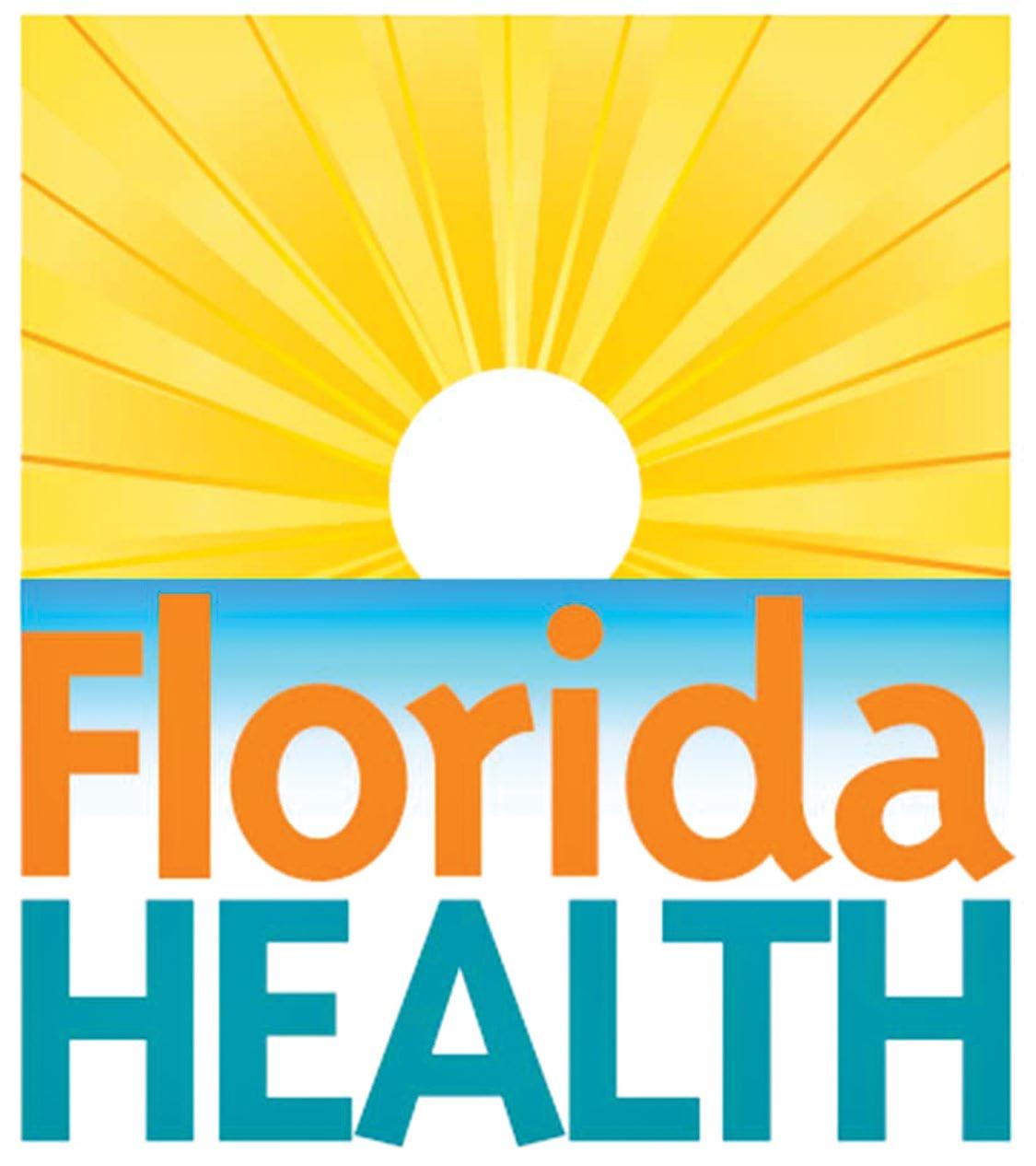
and have fun, effective activities and events where we can get to know one another as a community of nurses and increase our nursing presence throughout the state. So be sure and make that November 17th zoom meeting!
Wishing a safe and happy Thanksgiving holiday to all of you and your families!
See you soon on zoom!
Warmly, Cynthia
Cynthia Tagliaferri, RN, BSN, DNP Student FNA SE Region Director Cynthia.fna@gmail.com

The FNA Southwest Region would like to thank the FNA staff for putting together an outstanding virtual 2021 Membership Assembly. Thank you to all the presenters. Excellent topics discussed ranged from Equality and Inclusion to Self-Care and Wellbeing. During the COVID pandemic, selfcare is something that nurses must take time out for to physically and mentally recoup. Sometimes, it is okay to say “no.” I realize “no” may be a foreign word to most nurses, but it is okay to say it. As nurses, especially those on the frontline of this
health and peace during the Holiday Season and into the New Year.
Respectfully Submitted, Camille Baldwin EdD, MSN, RN

Hello to all the Great Nurses of Florida and West Central Region! It is with great excitement that I will be serving you amongst our esteemed board. Our elected President Janice Adams, Treasurer Mavra Kear, Secretary Valerie Halstead and ANA Representative Lola Knowles all reside in our beloved Region as well. The future of our Region is dependent upon ALL of our collective voices. I am dedicated not only in providing a platform for open dialogue (implementing and executing solutions) but also focusing on membership engagement and retention.
In recent news, due to FNA’s grassroot advocacy in collaboration with our local legislator’s bill sponsoring and support, Governor DeSantis funded and reopened the Florida Center for Nursing. We are so fortunate that the new location is in our Region located at the University of South Florida in which the opening ceremony was held on September 1, 2021 (pictured). It is imperative that we continue advocating for The Center’s funding as it will enhance the future of the most trusted profession during these unprecedented I want to take this opportunity to thank you
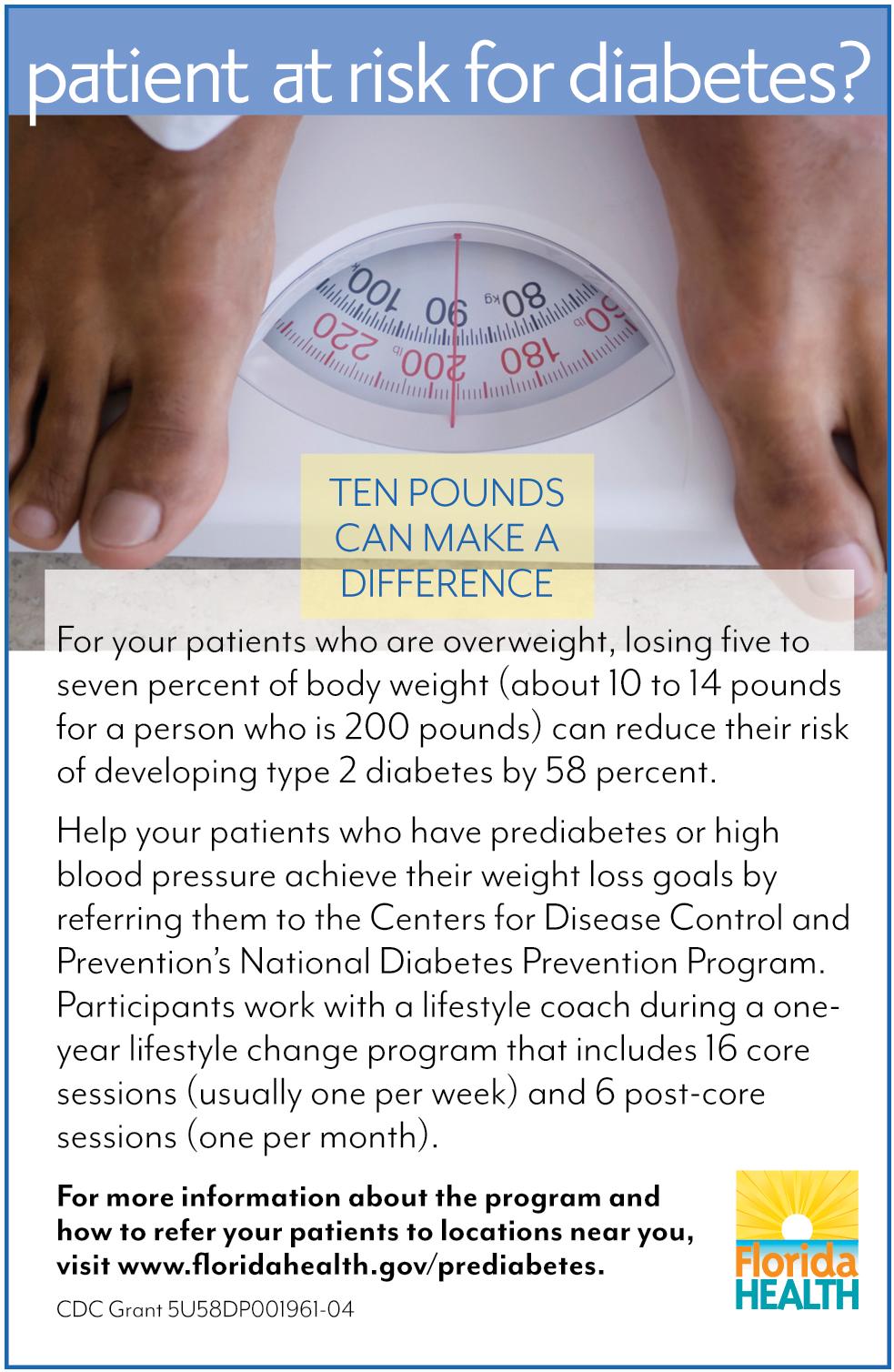
for allowing me to serve you and our great profession! 2022 is The Year of the West Central Region!

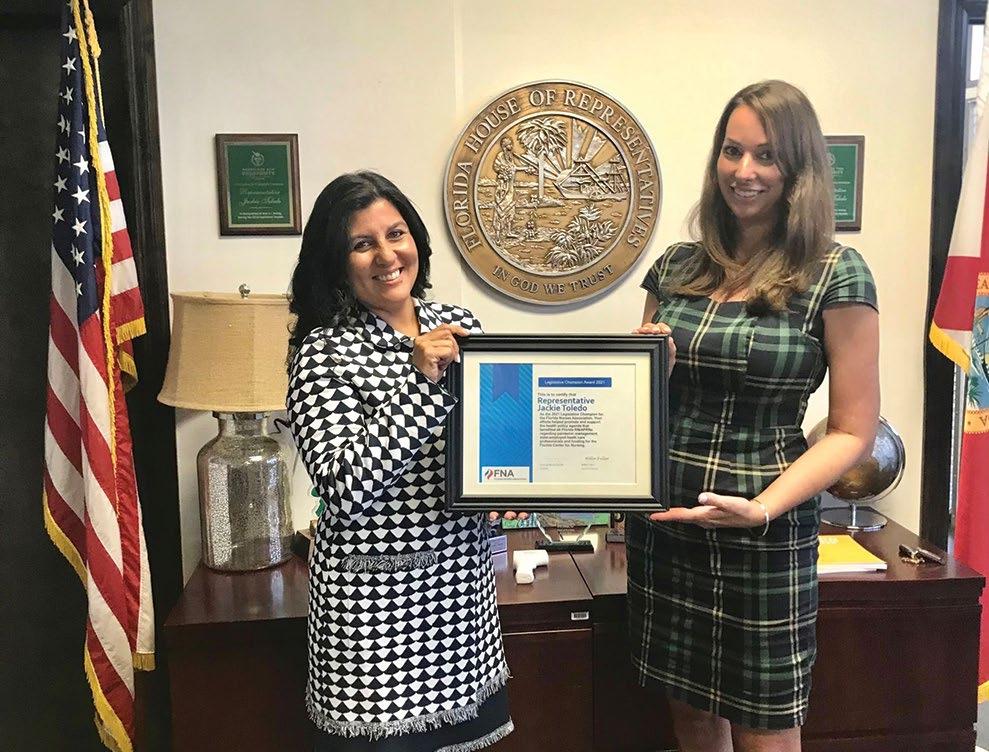
your patient’s prescription for empowerment

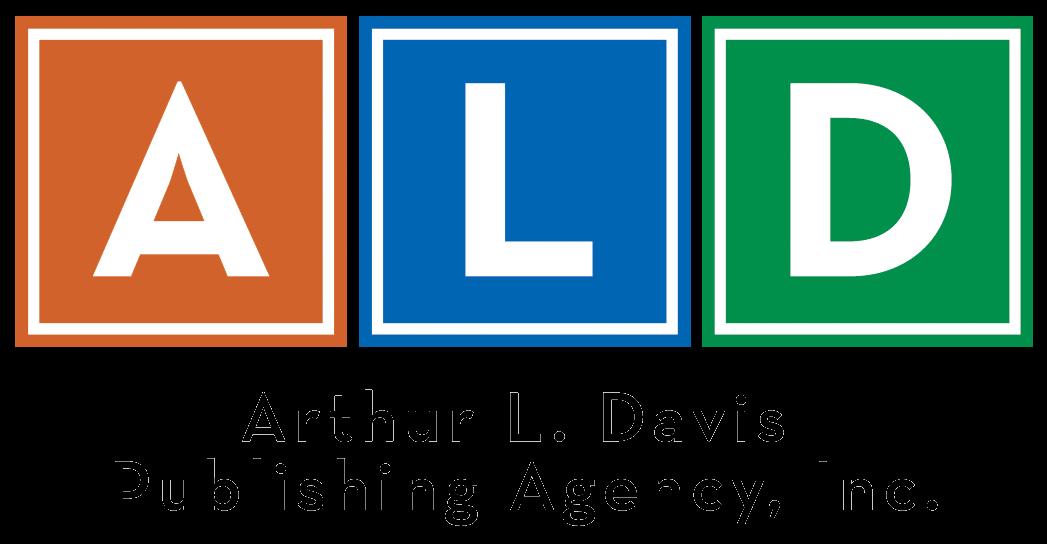

Visit nursingALD.com today!

Search job listings in all 50 states, and filter by location and credentials. Browse our online database of articles and content. Find events for nursing professionals in your area. Your always-on resource for nursing jobs, research, and events.
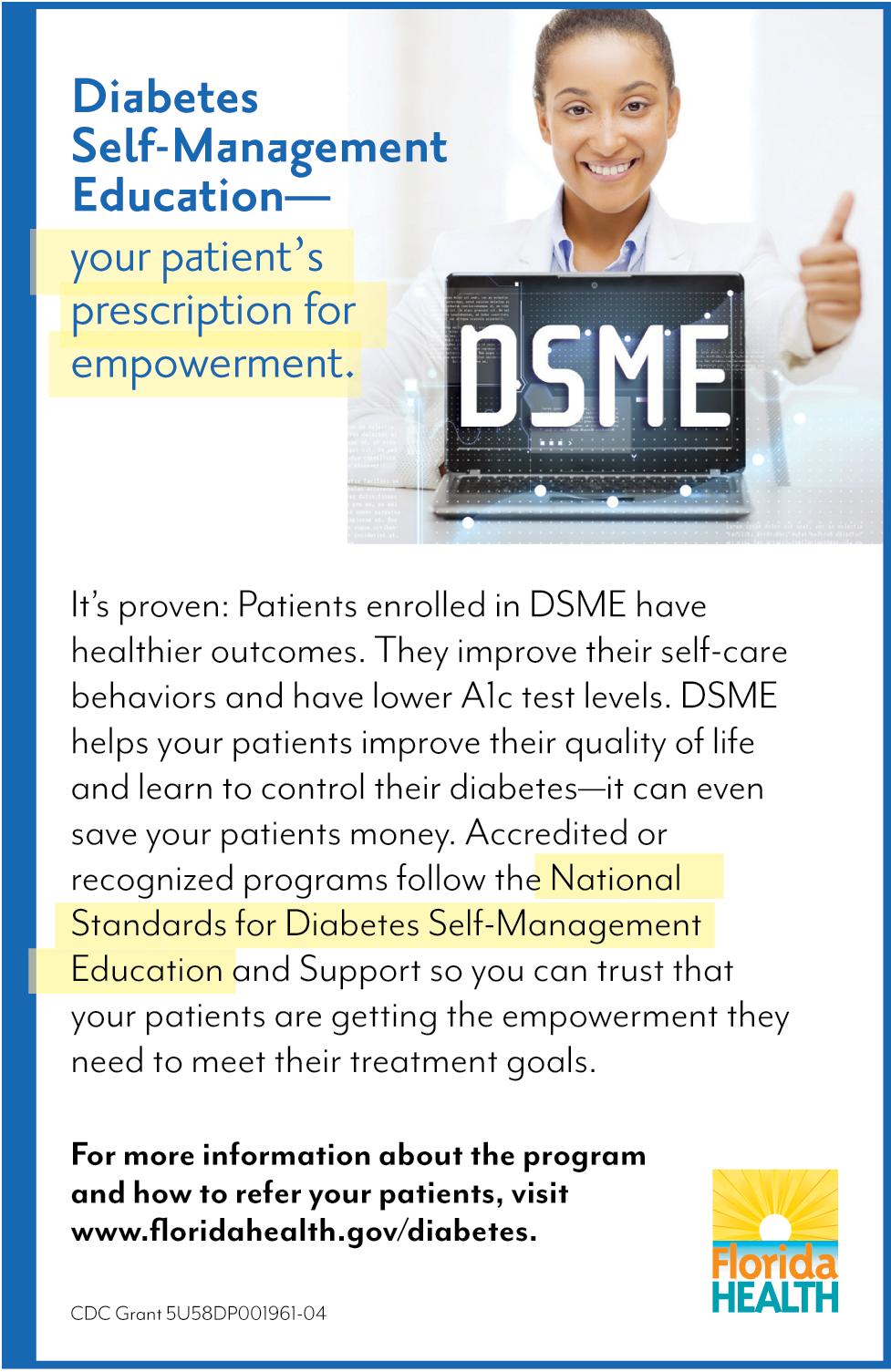

For your patients who are overweight, losing five to seven percent of body weight (about 10 to 14 pounds for a person who is 200 pounds) can reduce their risk of developing type 2 diabetes by 58 percent.
Help your patients who have prediabetes or high blood pressure achieve their weight loss goals by referring them to the Centers for Disease Control and Prevention’s National Diabetes Prevention Program. Participants work with a lifestyle coach during a oneprogram that includes 16 core sessions (usually one per week) and 6 post-core sessions (one per month).
For more information about the program and how to refer your patients to locations near you, visit www.floridahealth.gov/prediabetes.
CDC Grnnt 5U58DP001961-04

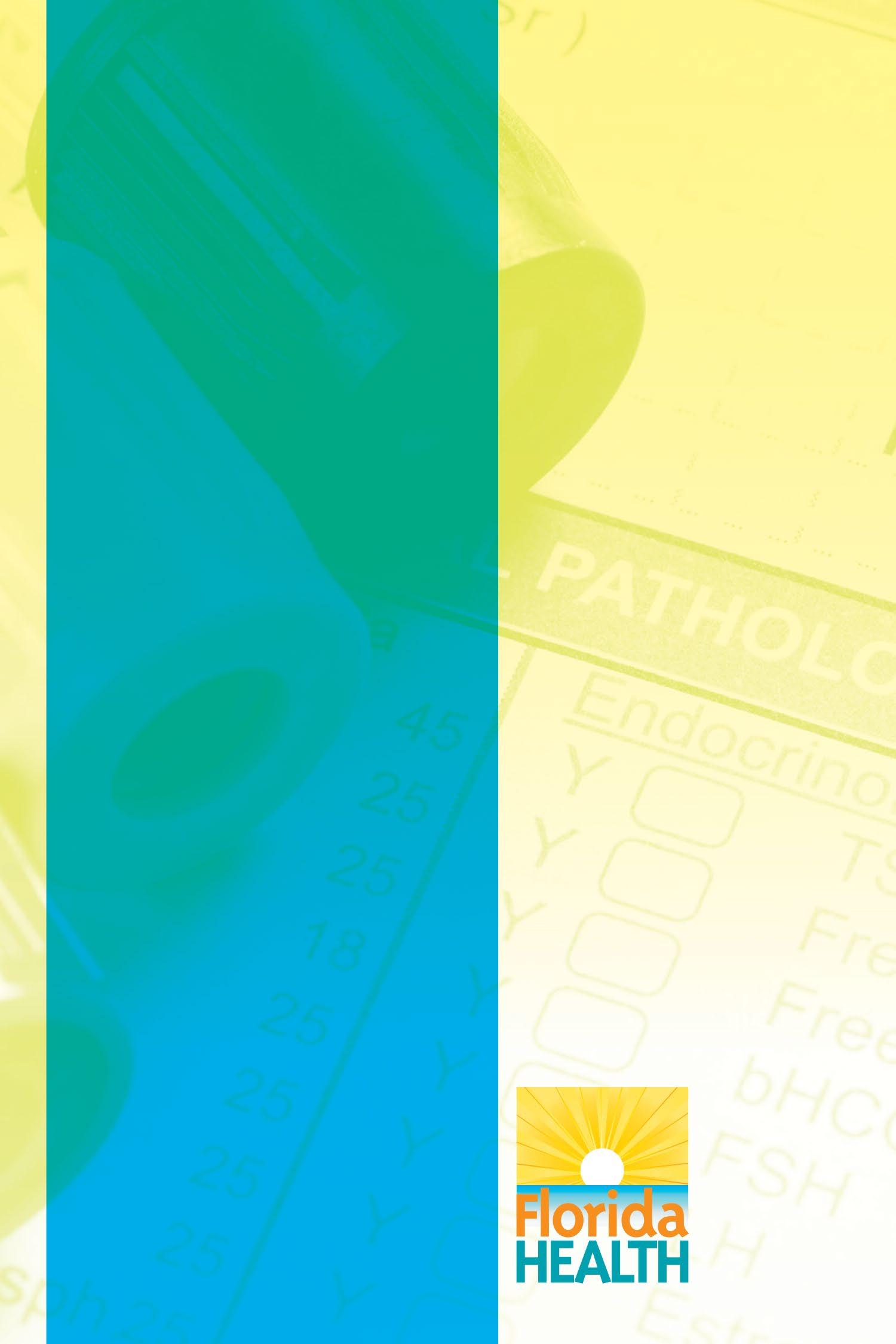
During the 2022 Florida legislative session, the members will have two constitutional required duties to perform. The first requirement is to pass a balanced budget. This is required to be completed yearly. The second requirement comes around every 10 years and is called redistricting.
The Florida Constitution directs the Legislature to redraw district boundaries during the regular Session the second year, following each decennial census.
Why should you care? Well, this process determines who will represent you in your city, county, Tallahassee and in D.C.
Although the terms “Reapportionment” and “Redistricting” are frequently used interchangeably, there are a few differences.

Redistricting is the process by which boundaries of electoral districts are redrawn to adjust for uneven population growth revealed by the data from the 2020 Census. State Legislatures, County Commissions, and City Commissions redistrict.
Reapportionment is the process of assigning seats in a legislative body among established political subdivisions. Congressional seats are appointed to the states after each decennial census.
There are some rules on how redistricting works. For example, districts can’t be drawn with the intent of favoring a party or incumbent. Districts must be contiguous in nature: they can cross a body of water and be contiguous but can’t contact at a corner and be contiguous.
Districts cannot deny or abridge the right of racial and language minorities to participate in the political process and shall be “as nearly equal in population as is practicable.”
Where feasible, districts will utilize existing political and geographical boundaries. And districts should be compact.
Florida saw a growth of 2,736,877 people from 2010 to 2020, approximately a 15% increase.
The fastest-growing U.S. metro area between the 2010 Census and 2020 Census was The Villages, FL, which grew 39% from about 93,000 people to about 130,000 people.
Osceola County had the largest county growth rate at 45%, growing approximately 120,000 people from 2010 to 2020.
In the 2020 Census, Florida officially passed New York to become the thirdlargest state in the Union.
With the increase in population, legislative districts need to grow as well. For example, current State Senate districts have 538,455 residents of voting age. Now they need to increase by 68,422. State House districts have 179,485 residents of voting age. House districts need to increase by 22,807. Voting age includes all residents 18 years of age and older.
It will be an interesting process to watch during the 2022 session. Individual legislators will have their own ideas on how to draw the maps, while a variety of interest groups will want their maps to be considered.
The legislators need to complete the session by March 11th. Once the maps are approved by the legislature, the Florida Supreme Court needs to review the maps and make sure the legislature followed the rules, such as favoring a party or incumbent. Districts shall not be drawn with the intent or result of denying or abridging the equal opportunity of racial or language minorities to participate in the political process or to diminish their ability to elect representatives of their choice. If the Court believes the legislature violated any of the rules, then the maps go back to them so that they can be amended.
The 2022 legislative session is right around the corner. With this added responsibility, be sure to contact your legislator prior to session beginning to discuss FNA’s legislative priorities. If you need a refresher on your grassroots, be sure to access the tools provided by FNA.
Remember, legislators are just like you, sometimes they need to be reminded what the priorities of their constituents are. Be sure that your Legislator is well educated on your issues prior to heading to Tallahassee.


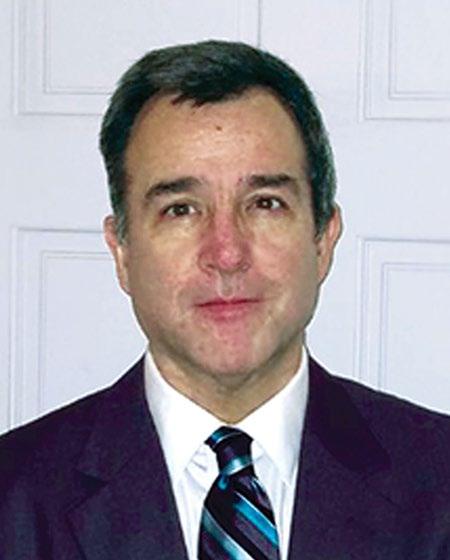 John Berry
John Berry
Employers are paying exorbitant salaries to fill the staffing deficits in healthcare organizations. Nurses do not receive benefits in exchange for the higher compensation. Nurses are being recruited not only from all over the United States but also from within Florida, and sometimes from just across the same town. Additionally, nurses from Florida leave our state and travel to work elsewhere for various increments of time, based on contractual agreements. Traveling Nurses are not a new concept the health care industry, they’ve been around for decades. Their presence elicits various responses from nurses who are employed in these facilities. Nurses are appreciative of their ability to fill shortages and enhance staffing, but they may be resentful of the fact that they work alongside them, doing the same work for significantly more compensation. This often creates feelings of resentment and even betrayal, resulting in lower morale and an unhealthy work environment stemming from poor working relationships. Nurses often complain that SOME of these nurses have no loyalty to the employer and no team spirit.
Traveling Nurses have always been compensated at significantly higher rates in exchange for not receiving benefits and the inconvenience of traveling and living away from home, however, the current recruiting efforts have escalated significantly in response to the COVID pandemic. Information has been shared
The FNA Special Interest Groups (SIGs) are gearing up for an exciting 2022:
Research Special Interest Group: This group will begin meeting early in 2022 to plan the 8th Annual Research and Evidence Based Practice Conference. More information about the conference will be announced in early 2022. Please consider submitting and abstract and sharing your research.
The FNA Review Committee, a sub-committee of the SIG stays busy approving research proposals that require access to the FNA membership. This is a member benefit that FNA provides at no cost to members.
Facilitator: Lois Marshall
Meetings: Held as needed, mainly in preparation of the July meeting.
Health Policy Special Interest Group: HP-SIG will be very active during the Legislative Session, staying attuned to bills and issues related to FNA’s Legislative Agenda. This will be a very active session and many important healthcare issues will be at the forefront of legislation.
The SIG will be participating in the Legislative Action Team and meeting with their State Legislators before session to make contact regarding our Legislative Platform.
Facilitator: Karen Perez
Meetings: Second Tuesday of each month at 7pm ET. Contact govt@floridanurse.org for access information.
Ethics Special Interest Group: The Ethics SIG met in October to discuss next year’s theme for the group. Topics that arose to the forefront were moral distress and PTSD within nursing, the importance of self-care as an ethical provision, and strategies to reenergize the nursing workforce. The group typically hosts at least one educational webinar or event each year based on the annual theme. Stay tuned!
Facilitator: Dr. Jean Davis
Meetings: Third Tuesday of each month at 6pm ET. Summer months and holiday months excluded.
The Holistic Nurse Special Interest Group has planned a Conversation from the Heart with the intention of hearing from Nurses about what is on their mind. They are particularly interested in resources and activities that the SIG could provide for nurses as well as information about the health and well-being of our nursing workforce and how they can make a difference.
Facilitator: Ann Fuller
Meetings: Third Thursday of each month at 5pm ET.
New Graduate Special Interest Group: Chaired by the Director of Recent Graduates, this group focuses on topics relevant to newly graduated nurses. The new Director has many ideas for engaging this group including social activities, community service projects, and more. Stay tuned for more information to be announced soon!
Facilitator: Danielle Weaver
Meetings: To be announced
If you are an FNA member, and would like to be added to any of these groups, please contact Iris Lopez at info@floridanurse.org
with us from our membership with examples of some of the bonuses with immediate payments:
• $20,000 Sign on Bonus with relocation expenses included
• $18,000 Sign on Bonus with relocation expenses included
• $15,000 Sign on Bonus with relocation expenses included
• $45.00 - $50.00hr starting pay rates
• $70,000 for a twelve-week assignment
We’ve received reports of Travelers being offered and receiving overtime before the full-time staff nurses creating feelings of not being valued or appreciated. That being said, it is understood that the employer has often been left with few choices when trying to navigate the nursing shortages which have been exacerbated by this crisis. Current staff in many cases have been stretched beyond their physical and mental capabilities. But current staff remain frustrated and wonder why they have not been able to offer higher compensation to existing loyal, committed staff and more attractive salaries to attract potential applicants.
Nurses have also expressed concern regarding continuity of care among the bedside nurses when travel nurses are predominant in a facility. This can be a very legitimate concern. When a new contract nurse, travel nurse, begins a new tour at a facility, they have the nursing skills, the education, but, they have to be oriented to the facility and the unit they are assigned to, the staff they will be working with, and the patients they will care for. For a number of nurses, this can create a significant amount of resentment as they must orient a nurse who is being paid significantly more than they are.
One solution we have worked on with our onsite representatives, is the negotiation of 12-week contracts for our members at one of our facilities. This strategy will not only reward the nurses’ contributions to the organization, but will also help management navigate the staffing deficits by helping fill the holes in the work schedules. At another facility we were able to negotiate a 9% increase to the nurses’ salaries which will help in their recruitment and retention efforts. The rates were brought up in two departments at an additional facility, and we are working on the third department where nurses are needed most. Finally, we were able to sign an agreement where the bonus for our members will be something we can be proud of as it exceeds other bonuses that are offered. We know there is more to be done, and we continue to work with the facilities to find solutions for our nurses and ultimately, the patients they serve.
Recruiting efforts by agencies as well as health systems have accelerated to an unprecedented pace since the pandemic. Hospitals, long term care facilities and other healthcare organizations are struggling to navigate the nursing shortage every day. Nurses are seeking alternatives to the stability of “secure” employment with health insurance and either a pension plan or a 401k Plan. It seems there is a bidding war now for frontline nurses which consists of the highest salary at any given moment. The question lies in the sustainability of these current practices and what the outcomes will be for nurses, for patient care and the future of nursing across the country.
Dear HCP members,
Again, I thank you for your dedication and hard work in protecting all of us, the residents of Florida, from Covid-19 and all other public health concerns! You are our public health heroes!!!
We have started our contract negotiations with the Governor and will need your support in educating the Florida Legislature regarding our needs. Please plan on coming to the FNA Advocacy Days in January when we can talk to our Legislators and educate them about the essential preventive services we provide.
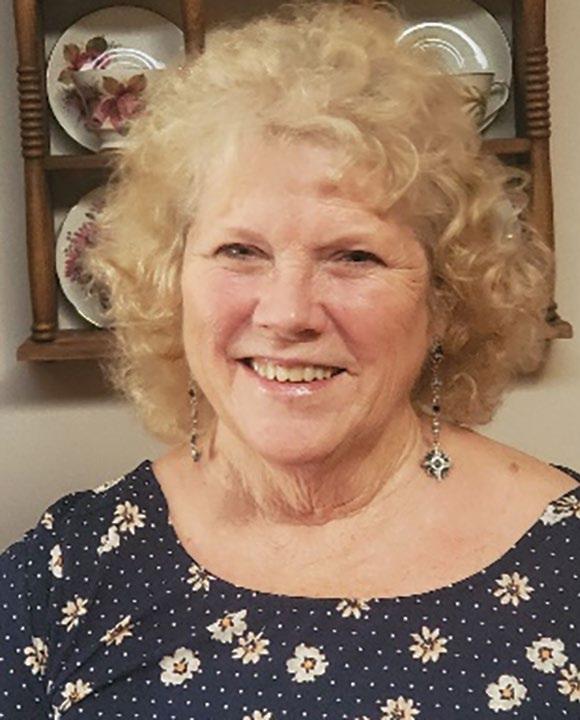 Debbie Hogan
Debbie Hogan
This year, we are again asking for a 5% pay increase, as well as pay increases based on Anniversary dates for our long-term employees in an attempt to equalize pay differences. Also, we are asking for an increase in the shift differential from $1hr to $5hr. We are also asking for clear language in the contract regarding emergency duties and pay for hours worked, especially on weekends and holidays before an emergency is declared. We also discussed the importance of our bulletin boards as a source of information to the state workers.
As you can see, we are at the table advocating for you. We value your dedication and prevention efforts to protect us all. I look forward to seeing you at Advocacy Days in January!
In Solidarity.
Deborah Hogan, RN, MPHChristine Ardalan’s groundbreaking book on public health nursing during the Jim Crow era is coming out in paperback form in November of this year. Public Health Nurses of Jim Crow Florida offers a distinct window to examine how white and black pioneering professional nurses tackled the state’s health issues born of race and poverty. They faced an uphill task considering the stark differential between white and black infant mortality, tuberculosis rates and other diseases. These nurses were often the only ones available to exert influence and serve all regardless of race. These early public health nurses laid the groundwork for today’s community nurses who continue to strive for health equity.
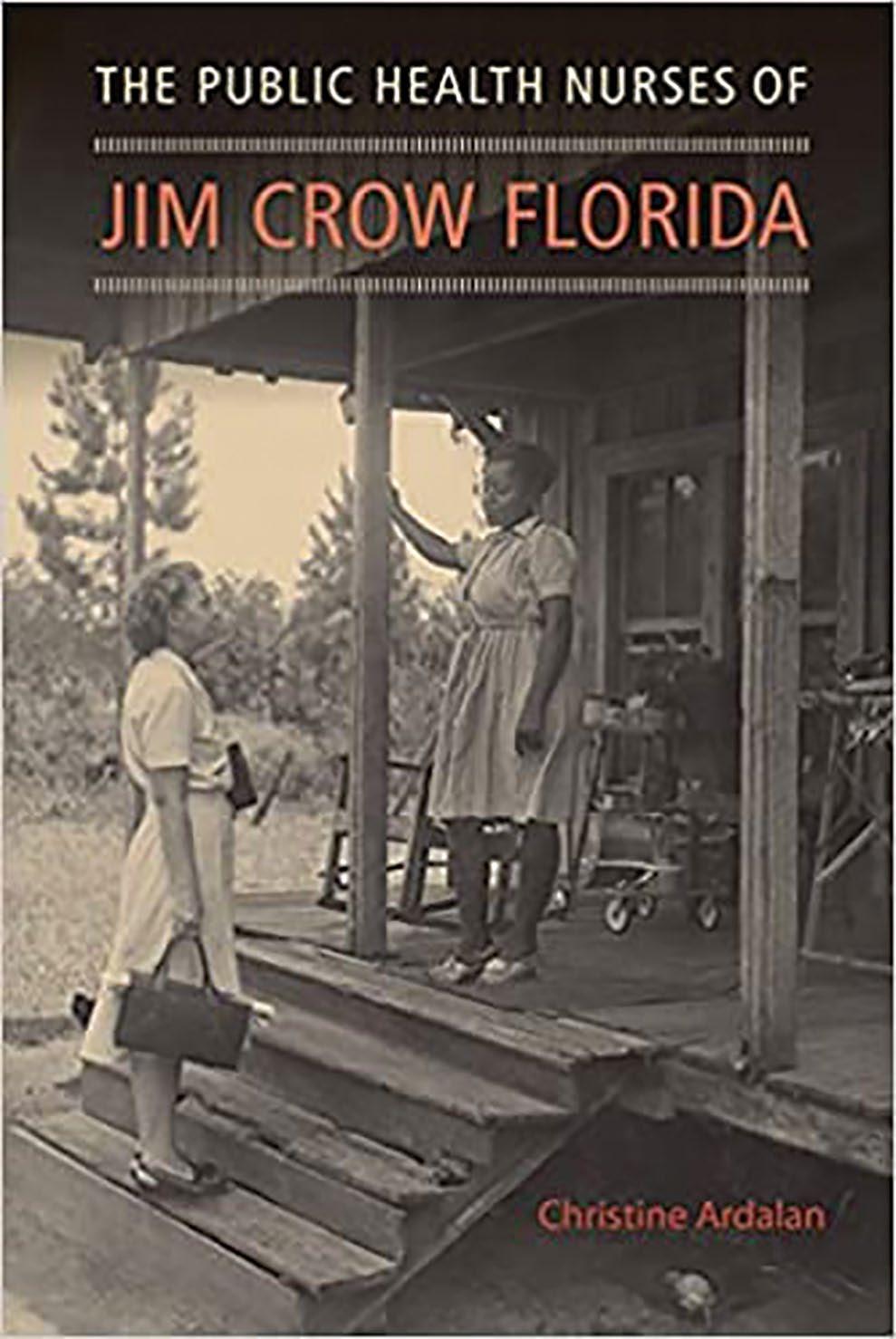
Ardalan lives in Miami and has direct experience with the consequences of racial segregation in the state. She met and befriended Thelma Gibson, an African American nurse and community leader who applied for a position in the state health department but had to drive far from her home to work in a clinic where the white nursing supervisor would accept her help. An understanding of this type of historical dynamic was critical to Ardalan’s work as she was born and raised in England with little knowledge of American history.
Florida is a large state and unique in its geography. Ardalan searched historic documents to find accounts in the nurses’ own words illustrating how they climbed fences, traversed cotton fields, waded through flood water and drove “where there were no roads, to keep in the ruts in the sand roads, to drive through streams, as there were few bridges, and if there was a bridge to stay on the good planks.” The devastating hurricanes of the 1920s also offered dramatic environmental issues to include in accounts of the public health nurses’ work. Taken together, the cultural, geographical, and environmental challenges make Florida’s story a unique and captivating one.
This book shows how the disparities in health ignited the public health nurses’ mission to alleviate suffering. The nurses became bridges to connect with people. The interpersonal connections between these nurses and those they sought to serve may give insight to current conversations about effective health policies. As Ardalan has

stated, “My hope is a glimpse of the historical contingency in Florida will help to make today’s voices for change louder and stronger. My hope is we can change some of the ways we connect and support each other to address and change the disparities in today’s healthcare matters.”
Ardalan has pointed out that there are long-term effects of deep-rooted cultural mores that bred and perpetuated racialized health disparities. Understanding the historical context of inequities is key to meaningful action in the future. This points to the importance of telling the story of the public health nurses of Florida during the Jim Crow era and how they worked around barriers to serve those left out of the reach of modern medical care.
Ardalan does an outstanding job of explaining the context of the times in telling the stories of the nurses who were responsible for the health of entire communities. As a result of her work, she was presented with the 2019 Harry T. and Harriette V. Moore award from the Florida Historical Society.


The book is well organized and readable. It is also illustrated with photographs from the era. It would make a great addition for anyone with an interest in nursing history, those with public health roles in Florida, and for Florida faculty teaching public health nursing. It is published by University Press of Florida and is available on Amazon and through other major booksellers. from the Board and Staff of the Florida Nurses Foundation and Florida Nurses Association

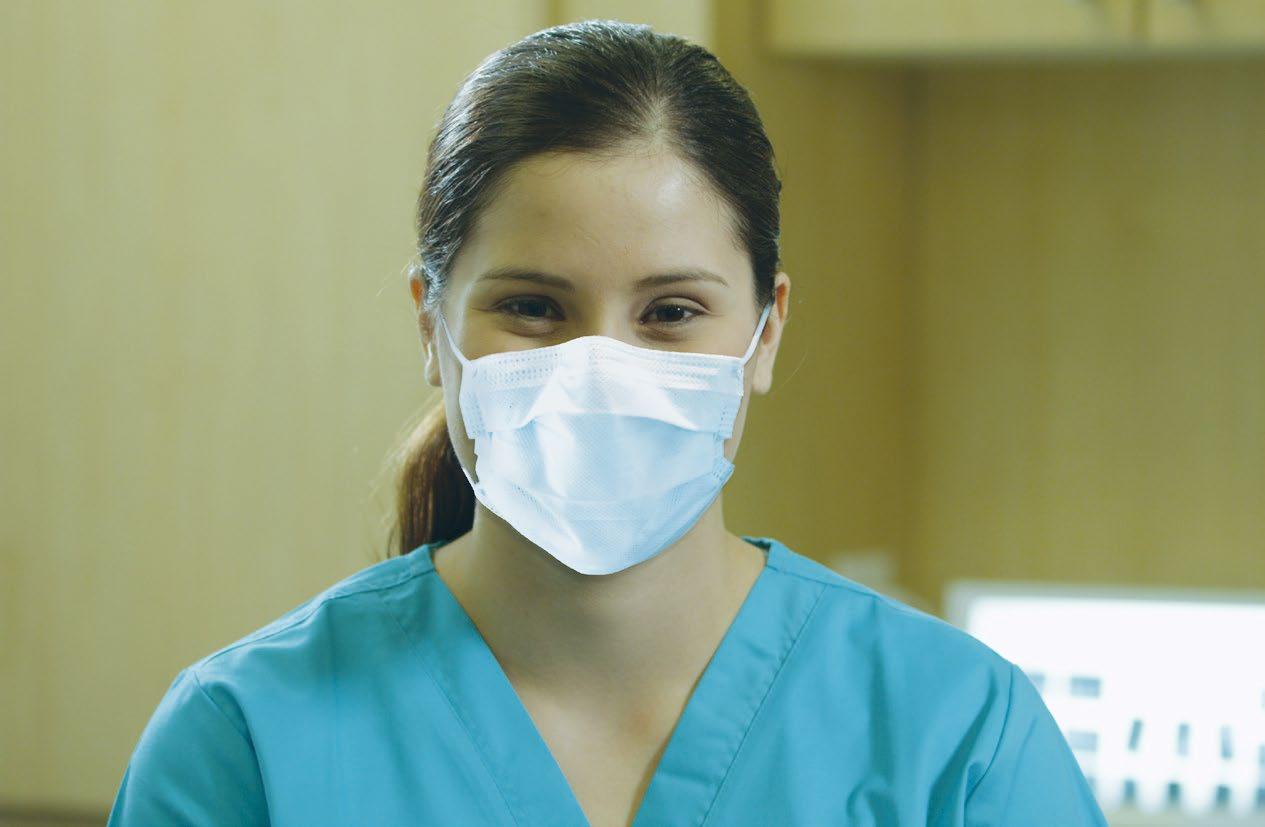
The mission of the Quality and Unity in Nursing (QUIN) Council is to promote quality and unity for nurses and nursing in Florida. QUIN Council membership includes state level organizations led by nurses that have a mission and purpose consistent with the QUIN Council mission and objectives. There are currently 20 participating organizations. We will be featuring profiles on each of the current membership organizations over the next several editions of The Florida Nurse.
Florida Society of Perianesthesia Nurses
and ASPAN membership benefits include discounts on specialty-related educational offerings, professional publications, networking opportunities and forums, a clinical practice network, scholarship opportunities, and assistance with certification exam fees. For more information, and to join ASPAN, proceed to https:// www.aspan.org/Members/ASPAN-Membership/ Member-Benefits. For your local component group, explore https://flaspan.nursingnetwork.com/
the APRN scope of practice in Florida. The Clinical Nurse Specialist (CNS) is an advanced practice nurse who practices within 3 spheres of influence: clinical expertise, nursing practice, and health care system innovation. We work collaboratively with other healthcare disciplines to drive evidence-based practice and achieve the best possible patient outcomes.
The FACNS mission is to enhance and promote the unique, high value contribution of the clinical nurse specialist to the health and well-being of individuals, families, groups, and communities, and to promote and advance the practice of nursing in the State of Florida.
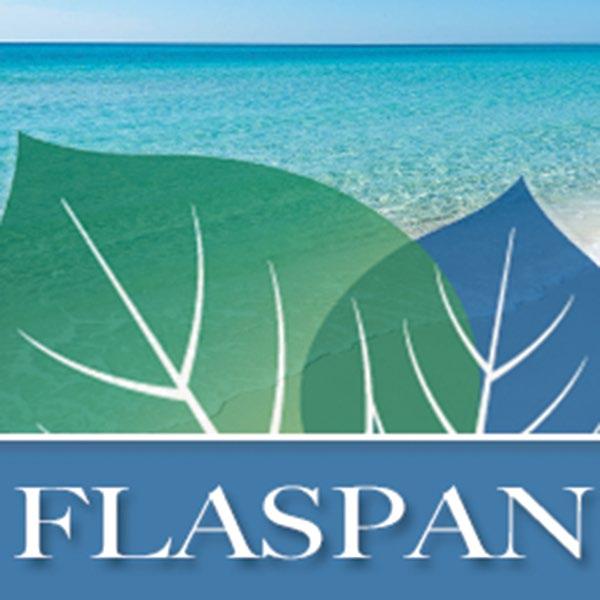
The Florida Society of Perianesthesia Nurses (FLASPAN) is a specialty organization for nurses involved in perianesthesia care in Florida. It is the state component of the American Society of Perianesthesia Nurses (ASPAN). FLASPAN’s mission is to provide education and promote the professional knowledge, competence, and growth of nurses working in all phase of perianesthesia care, thereby enhancing the care rendered to people undergoing anesthesia and/or surgery, in hospitals, ambulatory care settings, or any setting in which I.V. sedation is administered. FLASPAN
Lucie Dlugasch, Ph.D., APRN was inducted as a 2021 Fellow in the American Association of Nurse Practitioners in recognition of her outstanding contributions to clinical practice and education. Dr. Dlugasch is an associate clinical professor and the adult-gerontology program leader at Florida International University.




The Florida Association of Clinical Nurse Specialists (FACNS) is a state affiliate of the National Association of Clinical Nurse Specialists (NACNS). We are also a group member of the Florida Coalition of Advanced Practice Nurses and participate in advancing and advocating for
Our current focus and priorities are to grow membership, offer CNS specific education activities, develop CNS leadership role at local, regional, and national levels, and communicate the value of the CNS through local, regional, and national publications and presentations.
To join, you must have a Florida license: APRN with Qualification as Clinical Nurse Specialist. CNS students will be considered for membership. Membership in the National Association of Clinical Nurse Specialists (https:www.NACNS.org) is highly recommended. Contact us at facns.affiliate@gmail.com or find us at our Facebook Page: Florida Association of Clinical Nurse Specialists | Facebook
Qualifications to teach diploma and degree programs include:
• Current RN license in Florida
• BSN (Diploma Program), MSN (Degree Program)
• 3-4 years of recent clinical experience
• Meet all state Board of Nursing qualifications
We offer: Medical/dental/vision, 401K retirement plan, paid holidays, vacation, and education reimbursement for full-time and part-time employees. To apply visit https://careers.concorde.edu/
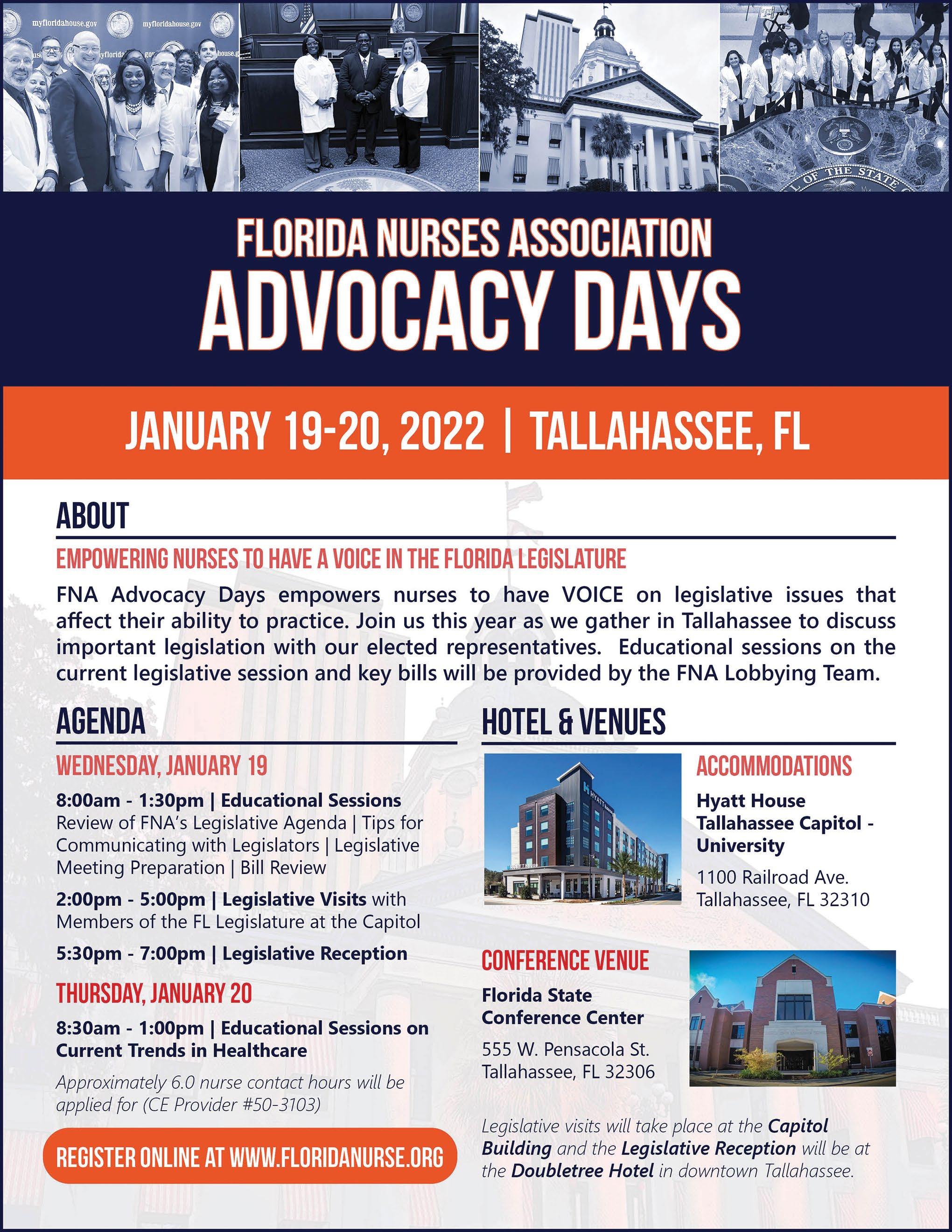

You attended both class and clinicals during the day while working nights, you scrimped and saved to pay your way through school while still having enough to feed and care for yourself and your family, and you invested every ounce of energy and dedication into each and every one of your current and future patients. For years, you focused on that impending graduation date countdown with such earnest excitement and hopeful positivity. The big day came. It was GLORIOUS. But, immediately following, you began to literally feel the reverberation of the ticking clock as you searched for your next nursing job to level-up to your new degree.
Yes, this is a normal feeling for every new nursing graduate, regardless of level. You spent years in school and now it is time for you to begin your career or further your career in the nursing realm. It is normal to feel the pressure of time after boards are passed to begin working in your new role soon thereafter or to even have had a job offer in place even prior to graduation day. Some people do, some do not. It is okay either way. But then, the world complicated things a bit more with a worldwide pandemic.
As nurses we do a really good job of prioritizing, sometimes, to a fault. Some of us spent the years of continuing nursing education working bedside with our patient population that we love. Is it normal to feel that we would be betraying, even abandoning our beloved patients if we wanted to move on in our nursing careers in the middle of a pandemic? During a time when our units are short-staffed, our co-workers are burning out, and our patients and their families need us the most?
Each of us have had to make a decision to either hunker down and ride out the virus in our current workplace or take this time as an opportunity to leave and start anew. For many, due to the lack of available positions due to role saturation or offices operating with limited staff and resources, whether these positions were for nurse practitioners, leadership, or outpatient practices, the decision was made for us. Even as life is beginning to normalize as state restrictions are lifting, many nursing professionals are still struggling to find jobs in their new roles.
As you maintain your current role and search for your next nursing home or if you have recently graduated and are not finding what you want immediately, these are the points I would like for you to remember:
1. Give yourself grace. Give yourself time. It is not realistic to expect yourself to have found your new “dream job” immediately following graduation. In fact, many new nurses/nurse practitioners do not find their clinical home until 4-6 months following pinning. Throw in a pandemic? Understand that it could take up to 1-2 years to find the role in a place where you know you belong. Do you want to accept what you can find “just to get the experience”? Then do it! If the job opportunities just are not there, continue your wait. If you find it before that 1-2 year mark, FANTASTIC! If you do not, do not panic. You will in time and it will all eventually make sense to you why the other positions have not worked out before.
2. Focus on what you can do at the moment. You cannot control the world or the opportunities for jobs that are out there. Make the best out of every situation. If you are being required to float in an area not in your specialty, ask yourself to look for the positive. Floating to another floor for an adult Baker Act sitter shift when your home unit is pediatrics can allow you the time to speak with a patient you would not normally to help broaden your nursing interview skills and refresh
an area of nursing you have not been privy to since nursing school. It is in these happenstance opportunities that small seeds can be planted in our minds that could help to inspire new ideas or goals in our futures. Life has a funny way to show us that all things happen for a reason.
3. Keep your application current. Ensure that your resume/CV stay up to date, set up a LinkedIn and Indeed account, get professional headshots taken, and network within your nursing organizations. Continue to build your resume with opportunities that you come across to further bolster your nursing repertoire. Volunteer to administer COVID-19 vaccines, write an article for a journal, precept a new CNA or nurse, or even garner stakeholder support in your organization to complete an EBP project on your unit. You can still grow while staying in your current role.
4. You are qualified, but so are your position competitors. You have applied for everything you have seen, you have followed up with recruiter services and employers alike, and you have dropped off resumes in person. There is nothing wrong with you. You just have not found your “place” yet. It is not easy finding a job on a level that you do not have paid experience with. You will get a lot of “no’s”. Be patient. Be persistent. Set your bar to include only the workplaces that will inspire you, invest in you, allow you to accomplish your goals, and continue to push you to the highest of your professional nursing potential. You will eventually get your “YES”.
Dr. Alyssa King has spent the last seven years of her nursing career working bedside in a level IV NICU at St. Joseph’s Women’s Hospital. Dr. King currently teaches as pediatric/obstetric clinical undergraduate adjunct faculty for the University of South Florida College of Nursing. She is now also a Nurse Planner and CEU-course author for CEUFast.com (CEUFast, Inc).


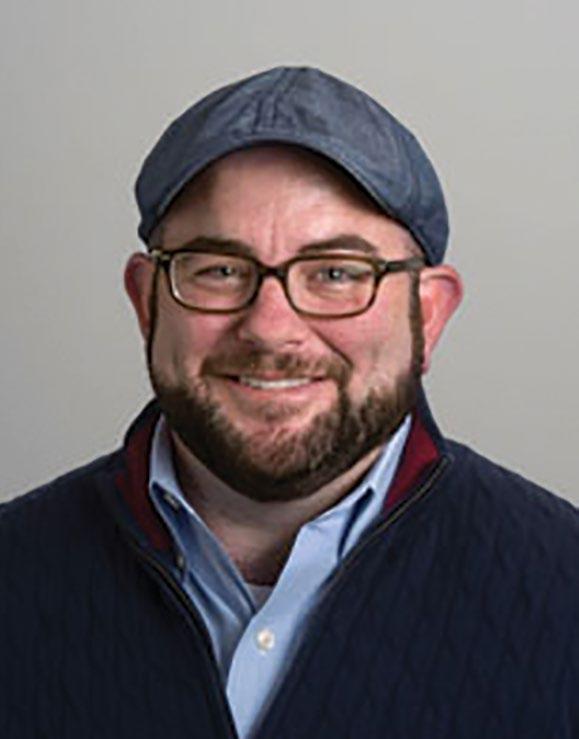
American society is fascinated with new trends (e.g., fashion and technology). This same fervor extends to healthcare, especially related to procedures and products that promise beauty and youth restoration. Pop culture and media coverage have facilitated comfort with discussion of LGBTQIA+ health issues. Specific to the transgender community, transgender health issues are commonly one of the highlighted topics for many nursing activities such as continuing education, conference presentations, and research. However, it is important to note that even though transgender health is a hot topic, it’s not a new topic. This lag in investigation and application of scientific inquiries is in many ways related to the stigma and discrimination associated with identifying as transgender and subsequent ripple effects (e.g., securing research samples).
A brief review of select key dates in transgender health history will hopefully serve to be a gentle reminder and emphasize the not so novel nature of this healthcare topic. For example, the first publishing of the Standards of Care for the Health of Transsexual, Transgender, and Gender Nonconforming People by the World Professional Association for Transgender Health (WPATH) was in 1979 (WPATH, 2012). Currently, the 8th edition of the SOC is proposed to be available in December 2021 (WPATH, 2021). In addition, the Gay and Lesbian Medical Association (GLMA), was first established in 1981 (GLMA, n.d.). GMLA is a national organization of lesbian, gay, bisexual, transgender, and queer (LGBTQ) healthcare professionals, whose mission is to promote health


equity for LGBTQIA+ identified individuals in healthcare, professional, as well as learning environments. I want to encourage nurses to not mistake this lag in scientific discourse for novelty. Nurses are lifelong learners. Specific to vulnerable populations, nurses should be aware of current health issues, factors that impede health as well as health-promoting strategies. If there are knowledge gaps, there should be an internal motivation to fill those gaps. I do realize that we cannot know everything, but at a minimum stay abreast of current health topics. Perhaps, may a goal of exploring one LGBTIA+ health resource or health topic a month.
A Few Nursing LGBTIA+ Health Electronic Resources:
• GLMA (http://glma.org/);
• CDC (https://www.cdc.gov/lgbthealth/index.htm)
• The Fenway Institute (https://fenwayhealth.org/ the-fenway-institute/education/the-national-lgbtiahealth-education-center/)
References
GLMA. (n.d.). About GLMA. GLMA: Health professionals advancing LGBTQ equality. Retrieved October 7, 2021, from http://www.glma.org/index.cfm?fuseaction=Page. ViewPage&PageID=532
World Professional Association for Transgender Health (WPATH). (2012). Standards of Care for the Health of Transsexual, Transgender, and Gender Nonconforming People [7th Version]. https://www.wpath.org/ publications/soc WPATH. (2021). Standards of care version 8. WPATH: World professional association for transgender health.
Tatiane Abud Pimentel is a proud member of the Florida Nurses Association, with an Advanced Degree in Urgent & Emergency Care and also a Bachelor’s Degree in Nursing, she has some published articles about the Nursing field in many media as Magazine Universita Science (BRAZIL), Jornal Brasília (Brazil) and more.

This note aims to bring an alert to professionals about the considerable increase number in toxic exposure during the pandemic period. It also emphasizes the importance of nurses in the prevention and propagation of actions that minimize this surge.
According to the CDC, every day 374 children in the United States are in an emergency department for poisoning issues and two of these children die. In addition, it reports that Poison Center Calls have increased about 20% during 2020. Unfortunately, the vast majority of these accidents occur due to inadequate storage of cleaning products, or even the combination of products creating a new one that can lead to irritation, burns, and poisoning. During the Covid-19 pandemic, people began to worry about cleaning their surroundings, and in their eagerness to take care of their family members, they stocked a greater quantity of products, making children more susceptible to accidents.





Another factor that raised this number of intoxications is the rising number of people under emotional crises. This situation creates an atmosphere to the intentional ingestion of large amounts of medication or other substances with the intention of causing their own death. Moreover, medicines are part of the daily lives of nurses, they are the main source for the prevention and cure of diseases, however, the inappropriate and abusive use of them, whether accidentally and intentionally, promotes significant harm to health and it is up to the nurses to be familiar with the signs and symptoms resulting from certain substances in excessive dosage. It is certainly clear that this knowledge will take those professionals a step further in terms of the most appropriate direction and care for each type of intoxication. It is also important to emphasize that accurate and conscientious actions must be put into practice by health professionals and by Organs competent bodies.
I strongly believe that the nurse can act as a supporter or initiator of the implementation of actions against this reality, as the health professional armed with the right information can act by disseminating preventive measures in easy-to-understand language and clarifying doubts about the use of self-medication, protection and supervision of young children, and promoting the search for help for the mentally fragile.
Protect the ones you love - PDF POISONINGS - CDC MARIN, L.; BARROS, M. Deaths by suicide: gender differences and socio-economic level. Rev Public Health. 2013; 37:
VIEIRA, F.B.A. Importance of occupational health nurses in the promotion and prevention of health in the face of pesticide poisoning in rural workers. Health, Ethics & Justice. (São Paulo); 23(2):63-69, 2018.
TEIXEIRA, F. Suicide, injuries and poisoning in adolescents: an epidemiological study. Rev Latino-am Enferm. 2017; 5(n. sp.): 31-6


New Members continued from page 25
Francette Ciceron
Pariss Clark
Peaches Clarke
Deidria Clayton
Jonah Contrell
Patricia Costigan
Kelly Curl
Bridgette Doyle
Dayseann Dreckett
Geraldine Emanuel
Yudith Espana Montes de Oca
Burnadetta Fergus
Krystine Flores Laquesha Ford
Lynette Foster
Anna Franklin
Kelly Freeman
Gary Frey
Denise Fuller
Ninoska Gaminara
Juan Garcia
Debbie Gardener
Tishana Gardener
Denise Garee
Rochelle Gilmer
Isha Gispert
Eliza Gomez
Aubrey Gray
Milton Greenberg
Lilian Guevara
Melissa Hadricky
Sharon Hernandez
Andrea Jimenez
Jincy Jobish
Katie Johnson
Philomina Joseph
Paolina Juan-Sebastian
Ashley Kalin
Dawn Kamen
Susan Keefe
Berlinda Kwashie
Karen Laney
Shade’ Lee Sin
Stephanie Legato
Ketty Lhermitus
Robert Lohlein
Veronica Londono Arias
Willine Louis
Pascale Mary
Evelyn Mathis
Debra Medoro
Eugenia Millender
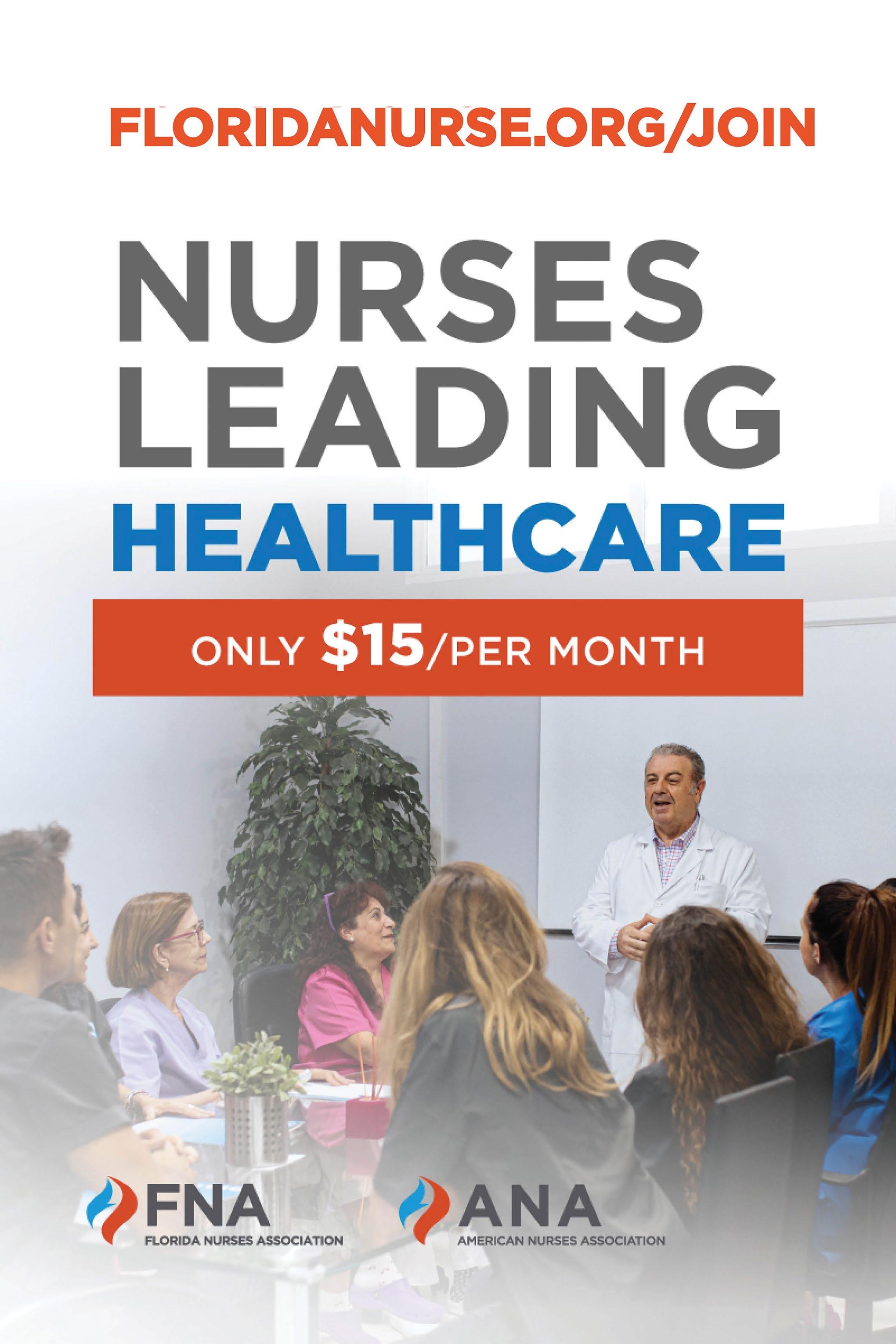
Stacey Mooney
Andrea Mulligan
Anupama Nair
Clarie Needham
Loren Neimark
Jonathan Newell
Jennifer Norton
Catherine Nunez
Abigail Olmeda
Barbara Paolucci
Tamar Pascal Sauveur
Elena Patel
Micheline Petit
Susan Philcox
Sharon Picariello
Michelle Pineda Rodriguez
Ericka Quiroga
Tynisha Roberson-Guzman
Tatiana Salazar
Lara Santoro
Zainab Savard
Shianne Sloan
Deborah H. Smith
Castita Soto-Mattson
Jennifer Teitelbaum
Ebony Telfer
Yamiley Theodore
Surany Thompson
Nicole Tomaras
Kemeisha Tournesy
Jeneen Towns
Sreerekha Vasudevan
Luann Vevea
Stephanie Villadamigo
Desiree Visaya
Beth Wiles
Wendy Wisniewski
Pamela Wong
Heather Woolf
Andrea Young
Mercedes Zequeira
Southwest
Shanice Barrett
Martha Bergren
Michelle Cedeno
Marie Cidera
Sharlene Daley
Jennifer DeLong
Azemina Durgutovic
Viviana Escobar
Vanessa Faria
Tina Gerardi
William Hummel
Yan Johnson
Eileen Kennedy
Frances Lopez-Mendez
Evelyne Michel
Graciela Olvera
Parth Parekh
Krista ProvostTate
Joan Riswold
Vanessa Schulze
Roxanne Shissler
Lezlie Vogel
Kim White
Patricia Wright
Zulay Zayas
South
Cassandre Alcemora
Oscar Alean
Ana Maria Alvarez
Nathaly Alvarez
Yamina Alverez
Janice Anderson
Laura Arozarena
Sherine Bailey
Jennie Bandin
Briana Baptelus
Rachel Bertschman
Michael Birnbaum
Guerna Blot
Celeste Boyd
Elisa Broadway
Faith Brodschneider
Esther Bromberg
Donna Brown-Richards
Rico Burgess
Simone Burgos-Juteram
Shakera Burke
Neudys Bustamante Jorge
Eduardo Bustillo
Cynthia Calle
Jayne Cambas
Eva-Maria Capote
Maria Casey
Rebecca Castillo
Angelys Centeno
Jose Centurion
Kathryn Cepero
Shawna Charles
Carisse Chin
Esther Clervil
Kimberly Comeau
Tangie Connor
Kadian Anesia Coote
Norma Corn
Odalys Cruz-Martin
Silvia Magali Cuc Cuesy
Natalie Curtis
Nathalie Dagobert
Endji Dalusma
Daniel D’Arbelles
Isis de Armas
Catherine De Castro
Cecilia de Socarraz-Novoa
Juana Del Sol Rodriguez
Erlande Derilien
Anais Diaz
Cateine Diaz
Jesus Diaz
Melissa Diaz
Valerie Diaz
Catalina Dominguez
Tereza Dominguez
Angela Dowd
Natalie Doyleygreen
Mathias Duru
Sheroline Eccles
Earlique Edwards-Singh
Sean Ellis
Moises Elvir
Jessica Escudero
Cecilia Eslick
Maria Espinoza
Liuba Mercedes Espinoza Antuche
Monise Etienne
Jazz’mn Ference
Maria Fernandez
Amy Flores
Mariola Flores Sabillon
Sherley Forestal
Marline Francois
Sheila Francois
Sandra Frasser
Angela Fuentes
Kevin Fuentes
Stephanie Galdeano
Mary Ann Garcia
Robert Garcia
Thalia Garcia

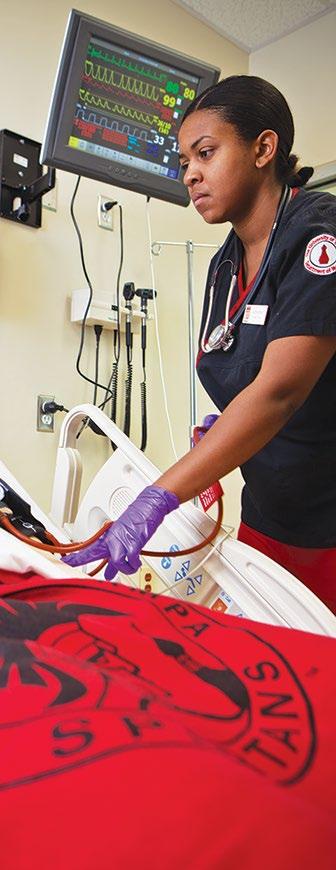
Rebecca Garrido
Elizabeth Gilmore
Yanil Gonzalez Quesada
Gladys Gonzalez Reyes
Veronica Grass Cordoba
Tania Grau Fernandez
Abel Guerrero
Liza Guillen
Cassandra Hackworth
Sarah Hankel
Kimberly Harris
Bryan Hernandez
Yazmina Hernandez
Haymee Humaran
Dorkis Iglesias
Kathleen Iturralde
Palony Janvier
Colleen Johnson
Heather Johnson
Denise Jordan
Nathan Kadan
Haley Keaney Luz Ledesma
Dana Lee
Danielle Leonard
Gabriela Lombardi
Barbara Lopez
Patricia Lopez de Mesa
Elena Lorenzo
Ashley Losas
Cara Lvely
Dania Machado
Natalie Marichal
Elizabeth Martorell
Hector Matias
Reeshan Meleth
Wiss Omaelle Mesidor
Juny Milfort
Rachel Milian-vinas
Jaidyn Mirando
Charlotte Mobley
Tabitha Mompremier
Cherrylene Montano
Alexsandra Morales
Marjorie Morales
Robert Morales
Marie Moreau
Tracy Moreno
Yisel Muguercia-Erazo
Rares Muresan
Tamika Murray
Marlene Nazario
Ayida Nembhard
Amy Nguyen

Evrose Noel
Sheneeza Nuyen
Christiana Okwaraji
Yanely Ortega
Anamaria Ortiz
Arizbeth Ortiz
Atoyia Ortiz
Maitte Ozambela
Eliana Parker
Sheila Parrado
Penelope Pattalitan
Yarelis Pena Guerrero
Jessica Penate
Adiane Perera
Belkis Perez
Anita Pittman
Patricia Planas
Samantha Powell
Sushama Prasad
Eduviges Puentes
Elmer Punzalan
Juliana Quintero
Tahira QUreshi
Gustavo Ramirez
Gustavo Ramirez
Natalia Re
Kristen Rebollo
Dennis Rejas Cabrera
Claudia Reyes
Marcos Reyes Urrutia
Hanscia Ridma
Ingrid Rivera
Lianna Rivera
Claudia Rivero
Fanny Rodriguez
Ivon Rodriguez
Lisandra Rodriguez
Zurama Rodriguez
Ana Rojo Garcia
Cecilia Ruiz
Michelle Saipher
Francelle Samson
Heilen Sanchez
Lizbett Sanchez
Kristen Sawyer
Hope Sewell
Faika Shah
Mekesha Shelton
Carolynn Sierra
Margilyn Silleza
Miriam I Silva
Vanessa Sonntag
Stephanie Sorensen
Jodi Spaulding
Kettlyne Stcyr
Thresha-Ann Stewart
Wendy Stuart
Lourdes Tatem
Nassima Taylor
Robert Taylor
Kenya Thames
J Ann Thomas
Victoria L Torres
Germaine Toussaint
Belinda Turner
Sahar Valliuni
maribel valmocina
Katherine Vaughn
Julie Velazquez
Sally Velo Rodriguez
Mayelin Vieite Ravelo
Kegt Vildor
Asia Villanueva
Mukesh Wadhwa
Takeria Williams
Rosario Wojcicki
Dunia Yur
Other
Amanda Pharr

